In this strange period I have done ‘Alphabets’ of 2 of my main interests being pubs and railways. So I am adding a third which is ‘Theatre’. I don’t have that many photos as I was mostly stage-managing so have included programmes instead.
A is for Aladdin.
Done this more than once, latterly as stage manager for Wonder Productions.
The programme cover comes from an early production by KATS (Kingswear Amateur Theatrical Society) which I both wrote and directed. We did about 12 pantos in all and they were great fun and popular in the village.
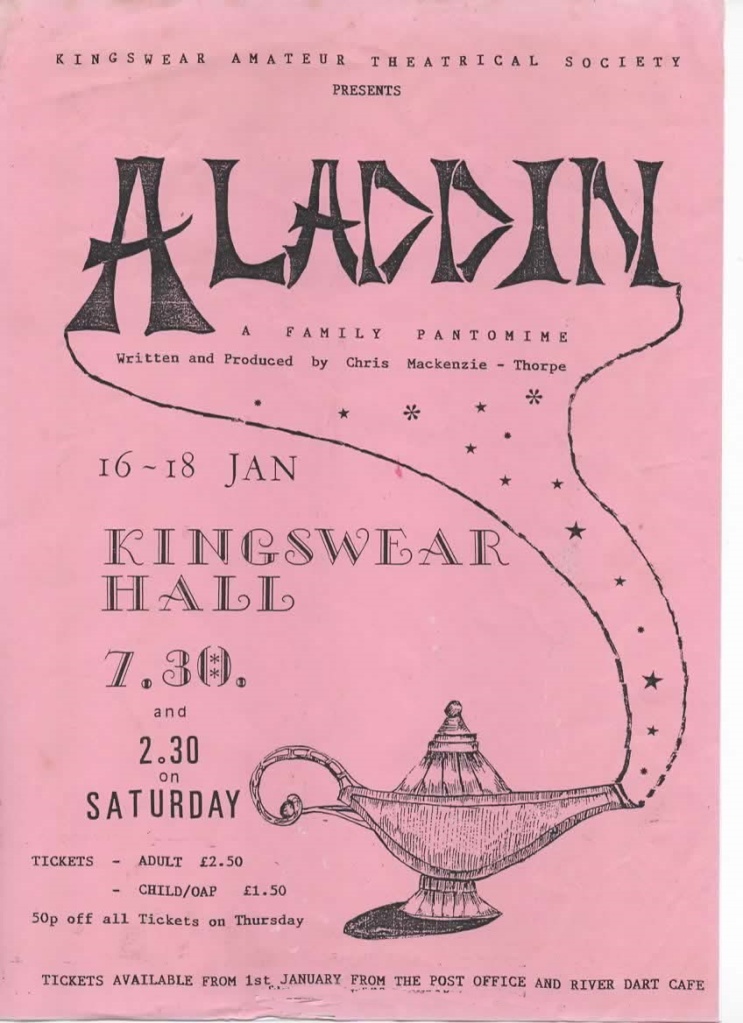
B is for Black Coffee.
Black Coffee is the only Agatha Christie play with Hercule Poirot as a character ( and incidentally the only one not played by David Suchet on TV).
Bijou Theatre Productions have done it three times during my time with the company, and for the first two I was Sir Claud Amory – poisoned at the end of Act 1. The first picture is from the first of these when James Mackenzie-Thorpe was the murderer – the swine!
In last year’s third version I was the butler Tredwell and for all 3 I was also Stage manager.
2nd photo is from the second production.
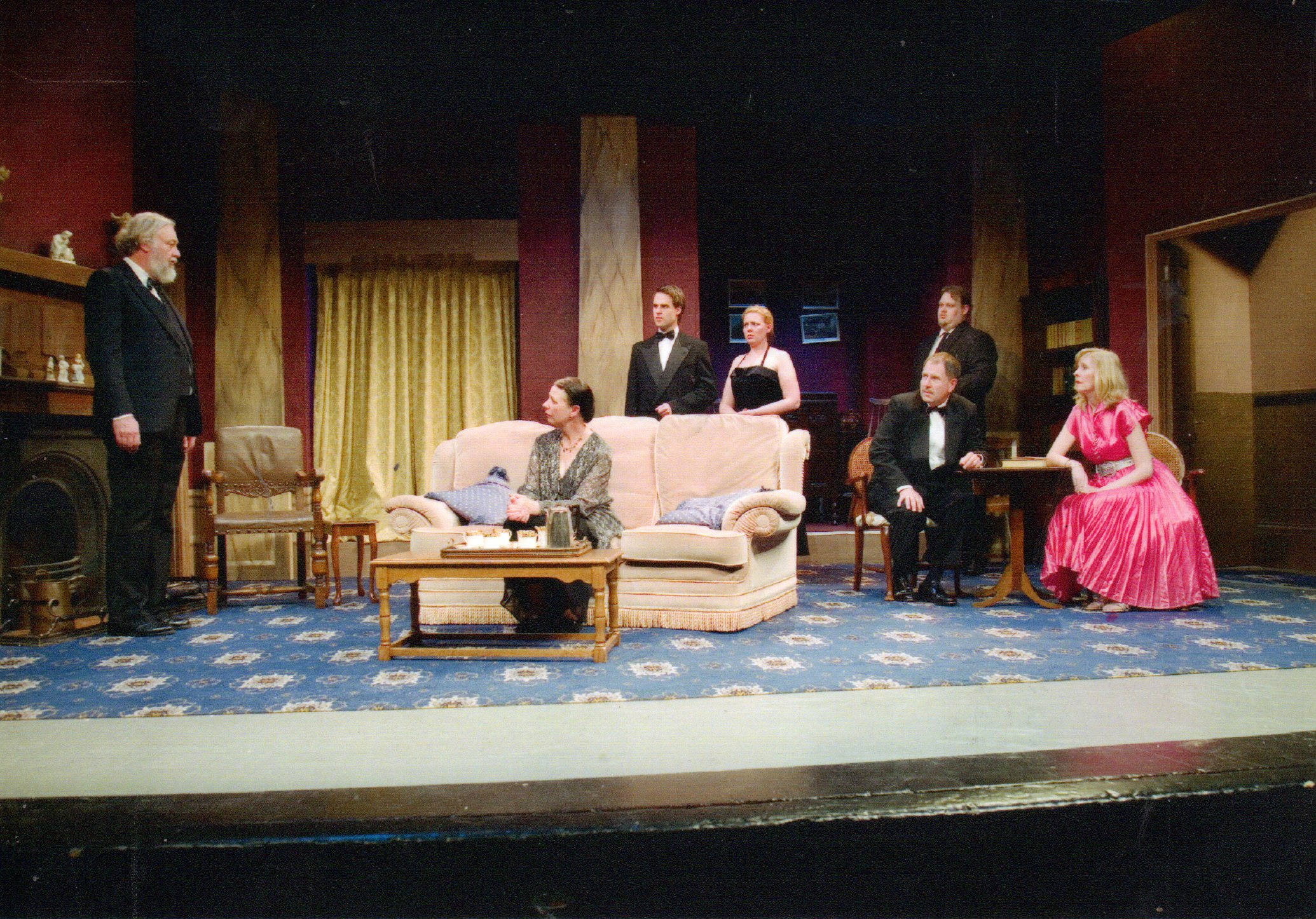

C is for (A) Christmas Carol.
I have done 2 full productions and in both cases I had a small part (Businessman) and stage managed the production.
2001 was Mark Cartier’s excellent production with a splendid if complex set. Angela Mackenzie-Thorpe did the props including the Cratchits Christmas Lunch with gravy ‘hissing hot’. A stickler for detail Mark wanted the gravy to steam – which it did. To Angela’s consternation the audience could not see it due to haze being used for effect!! The cast list is from this show.
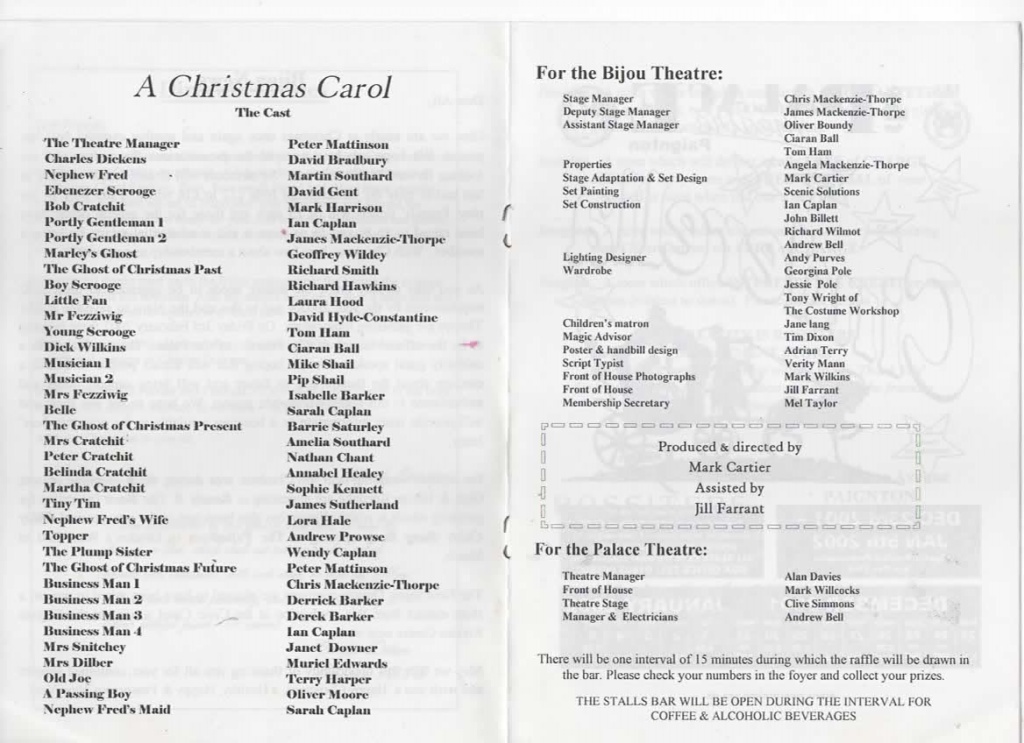
Pictures are from 2001 and then the 2012 Bijou Theatre Productions version by John Mortimer.John Miles as Scrooge with Richard Bearne and Ian Caplan . (he was in 2001 as well).
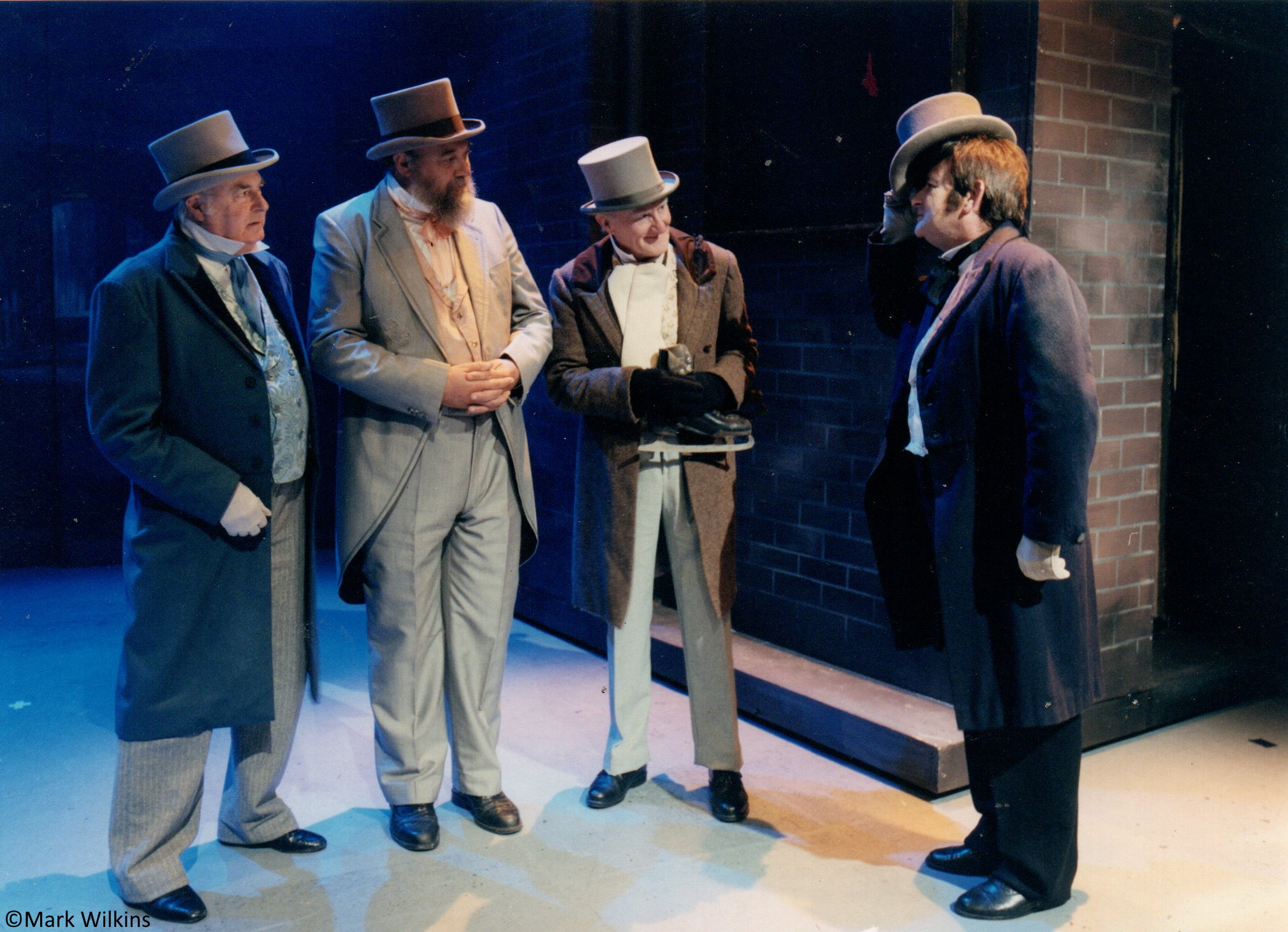
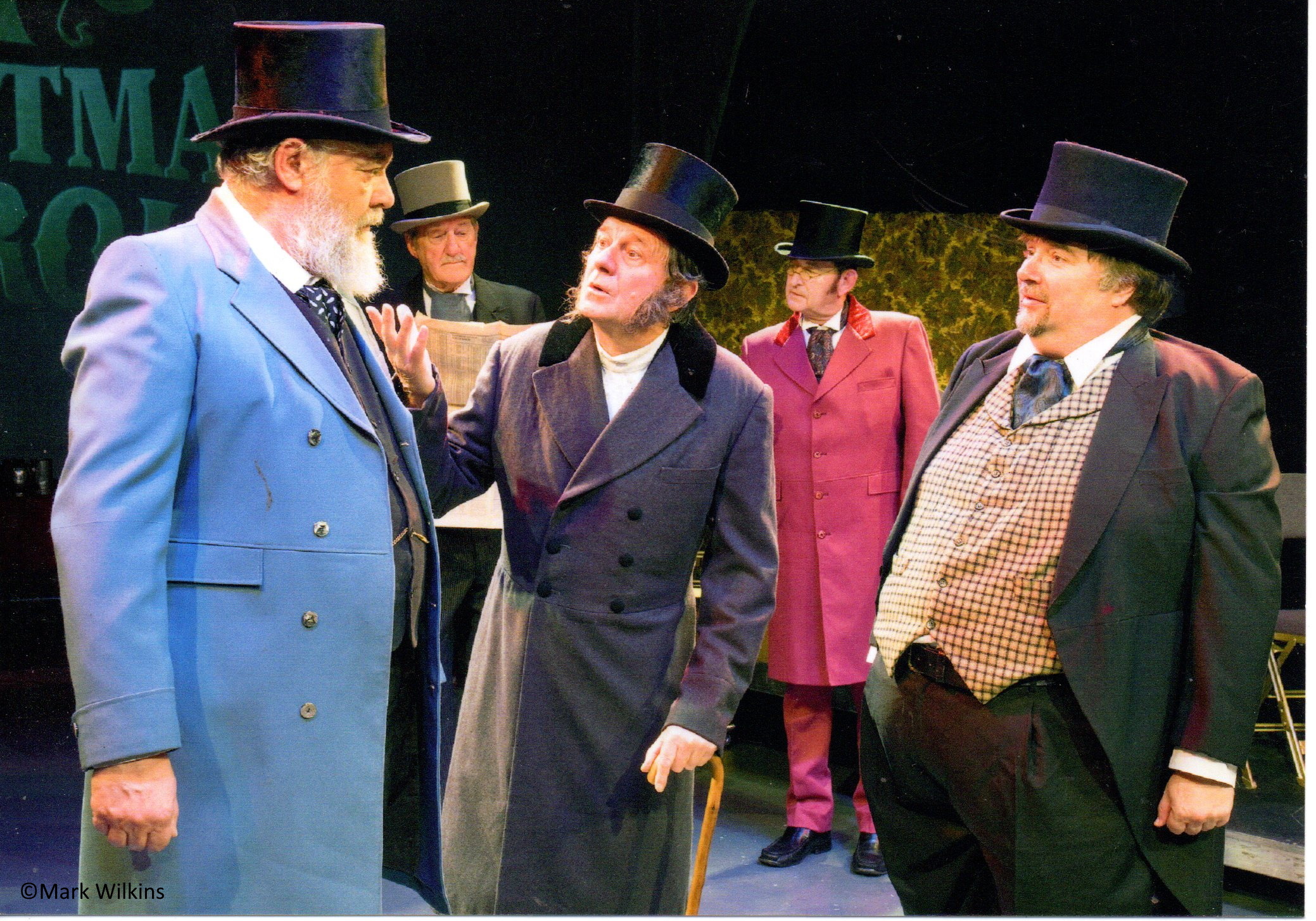
D is for De Sul.
Not theatre but a film. I did quite a few short films , as well as TV and film extra work but De Sul was one of my favourites and a great experience.
The film was an award winner at the Cornish Film Festival and was filmed entirely in Cornwall and in the Cornish Language. De Sul is Cornish for Sunday. It centres around the Cornish pilchard industry in the late 19th Century. A shortage of fish is causing hardship in a village such that when fish is spotted on a Sunday the men go out fishing against the wishes of the local priest (played by me) who objects to working on Sunday.
It was an fascinating time – I had to learn the Cornish script phonetically. We went as a family to see the premiere in Falmouth and I was surprised to see my face everywhere as per the poster.
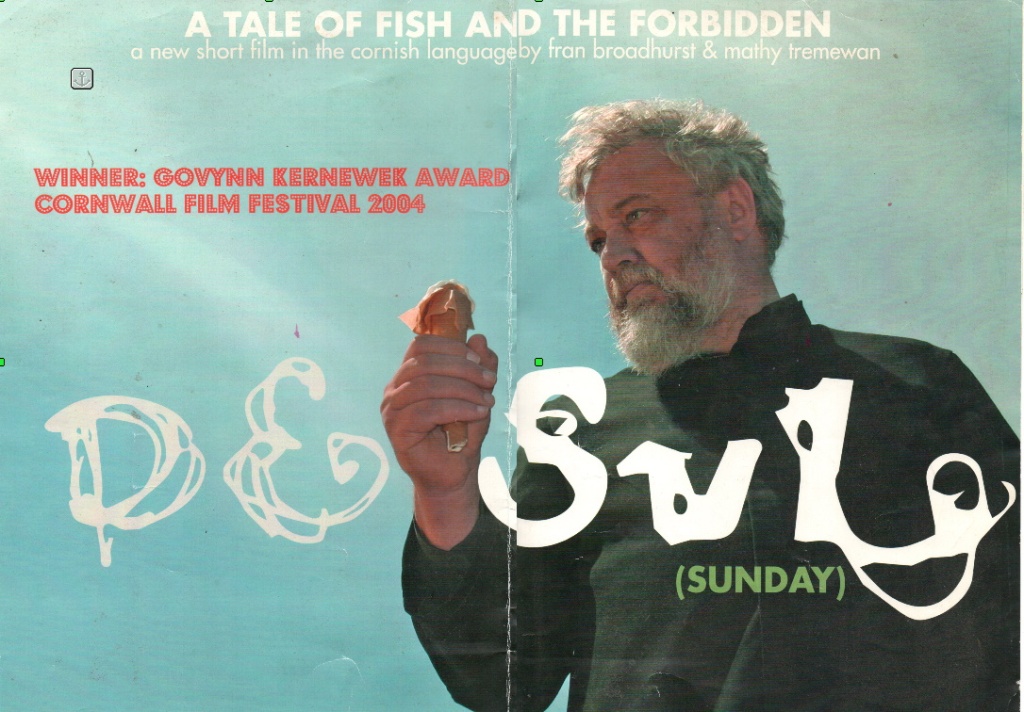
I was hoping to find an on-line link to see it – but can’t find one.
E is for Educating Rita.
Back to the theatre for this one. Presented quite a few years ago at the Palace Theatre by Bijou Theatre Productions.
A two-hander with a huge amount of lines for the 2 characters to learn but Nicola Samuel-Stevens and Mark Wilkins did a fine job. I was in my usual stage managers corner while the set had to be full of books which are then packed away at the end!
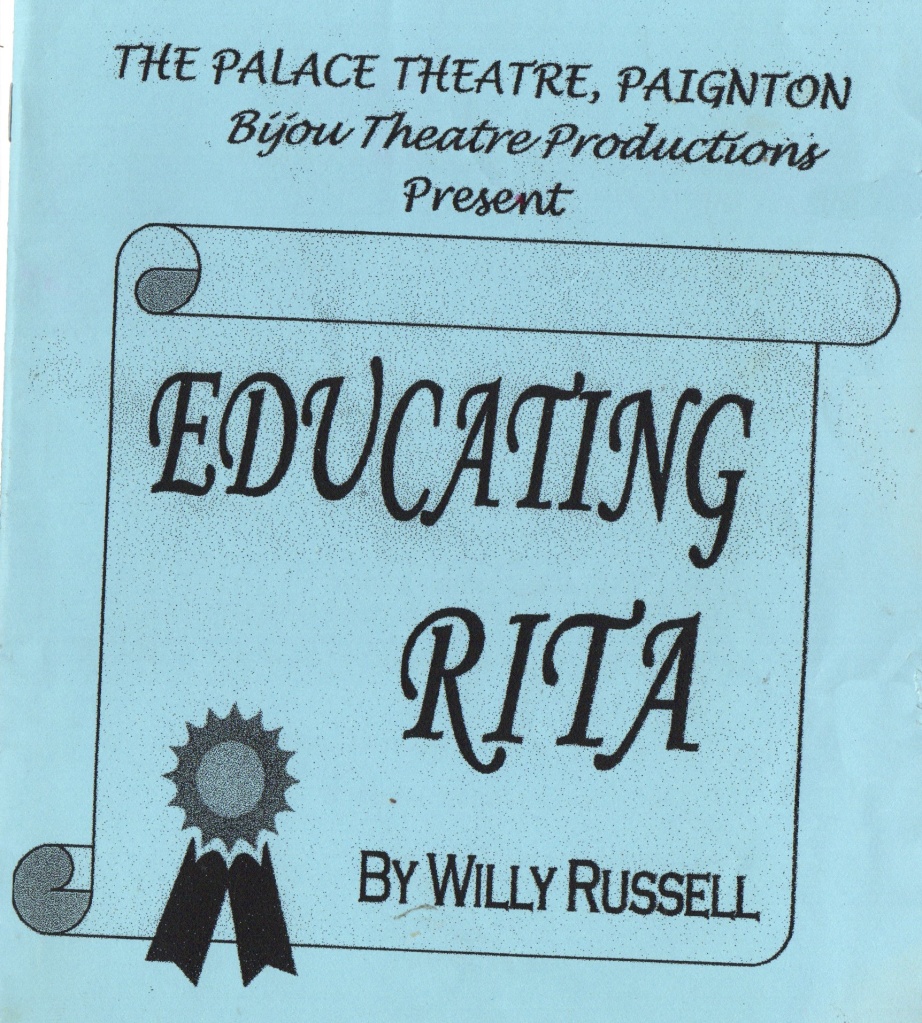
A very good production.
F is for (The) Farndale Avenue Housing Estate Townswomen’s Guild Dramatic Society Murder Mystery!
Surely the longest title of any play – somebody may correct me! Also one of the funniest plays with which I have ever been involved. It was my first production after years of absence from the theatre after I left school.
The picture is the only connection I have but this was the professional production at the Princess Theatre with Faith Brown and Anna Karen. My production was Dartmouth Players at the Guildhall and a far better show. As it is about the failures of an amateur production it worked better when done that way. The modern ‘The Play that goes Wrong’ seems an updated copy.
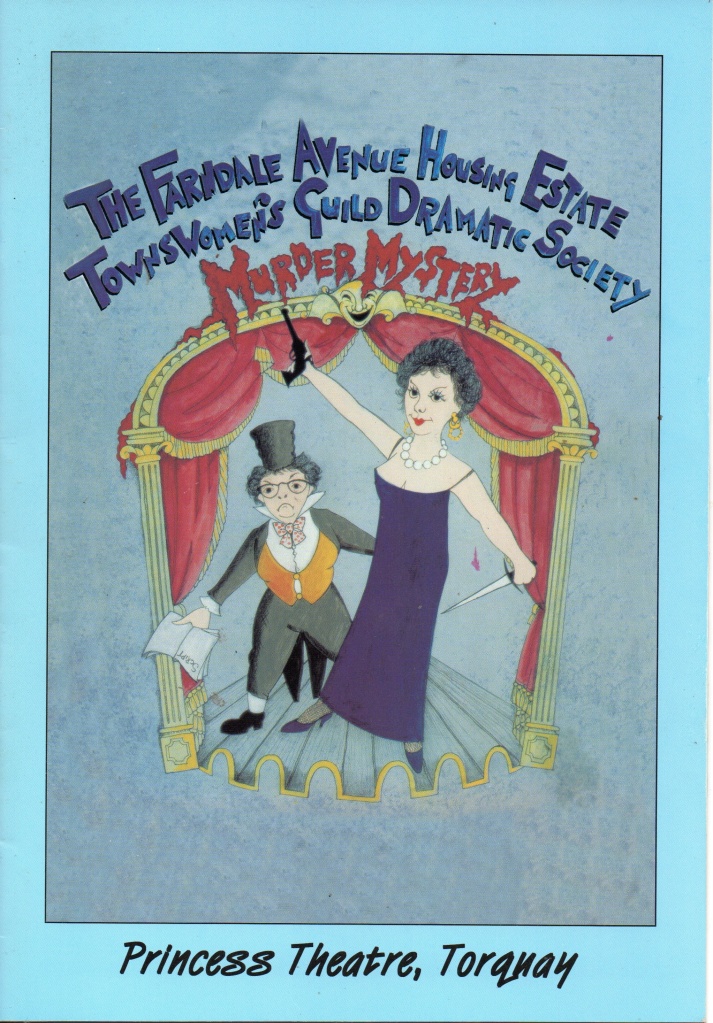
Suffice it to say that bits of the set -which I helped to build with Edward Kelland fell down, actors went missing, lines were forgotten – etc etc.
I would love to do it again.
G is for (The) Ghost Train.
Arnold Ridley’s (later of Dad’s Army fame) classic 1920’s thriller set on a Cornish railway station. This play is important to Bijou Theatre Productions as 65 years ago it was a first production for the company. I was last involved in 1998 in a Mark Cartier production with splendid lighting and effects from Mark and Clive Simmons. They were such that the stage appears to vibrate as the ‘ghost’ train ran through the station. I was stage manager then and the first 2 pictures are from that time. The third picture is for the current production in which I will play the stationmaster (type casting!) and Clive will stage manage as well as devising the effects. It was due to be on in April 2020 but postponed to next year due to the virus.
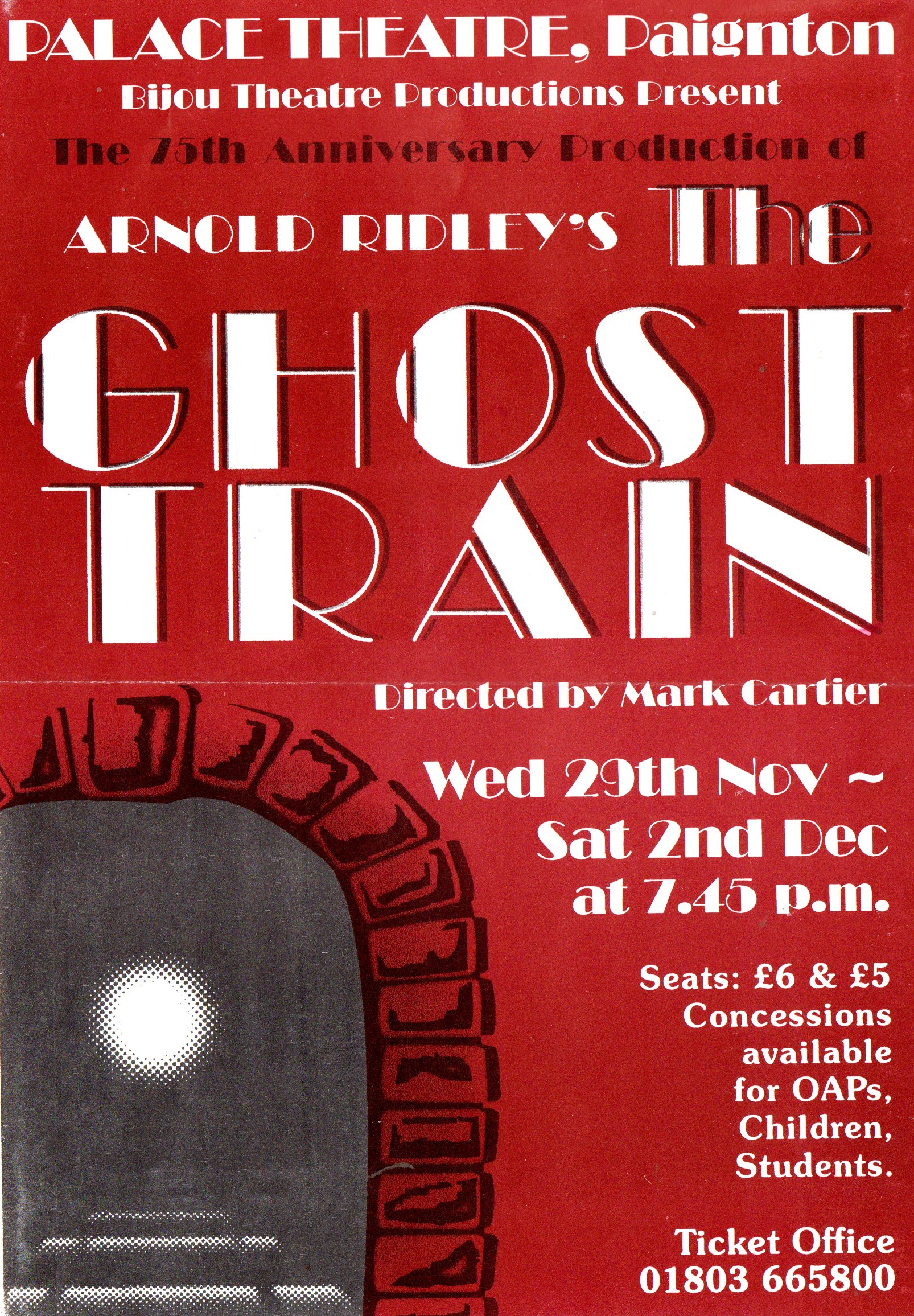
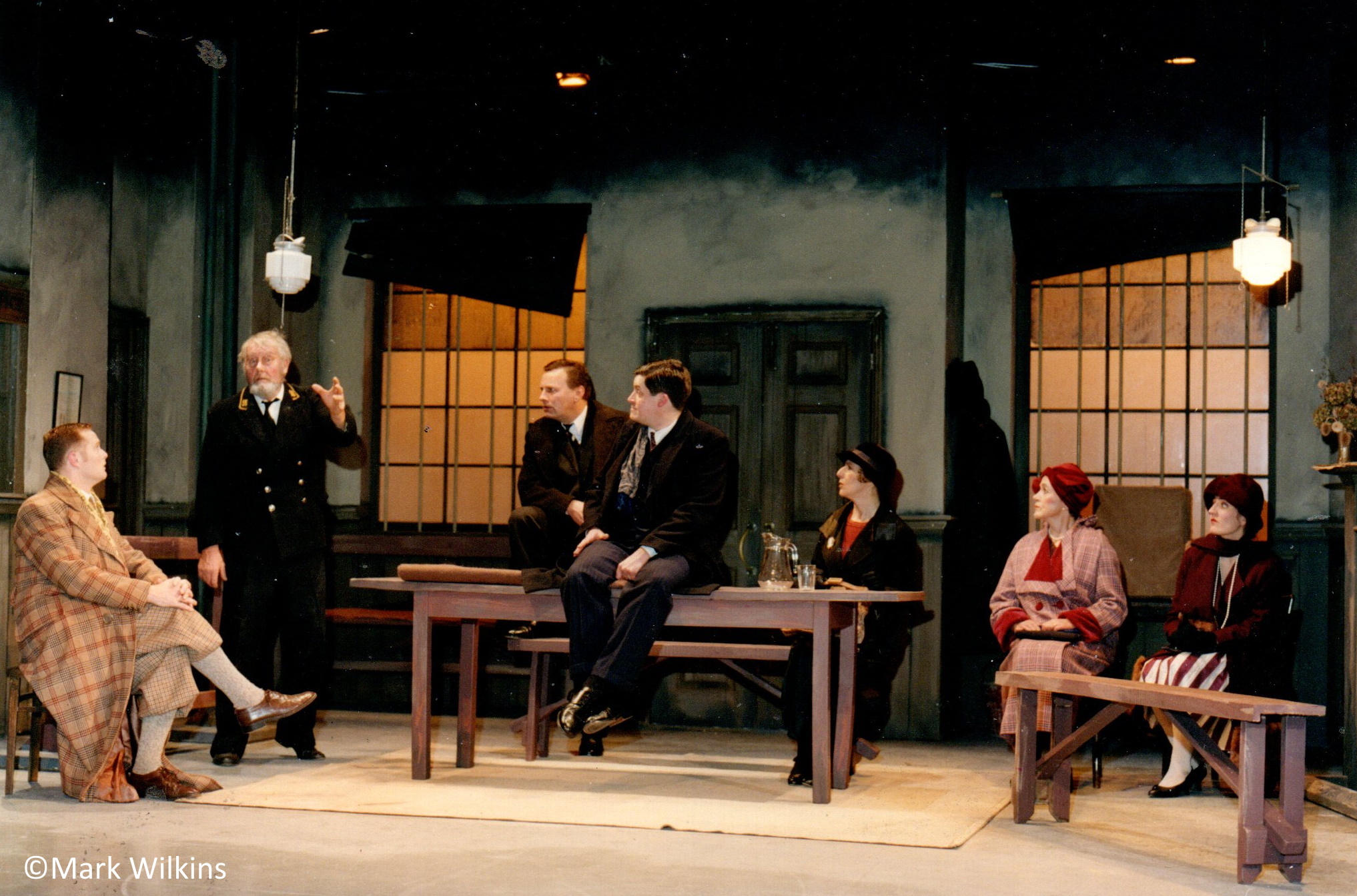
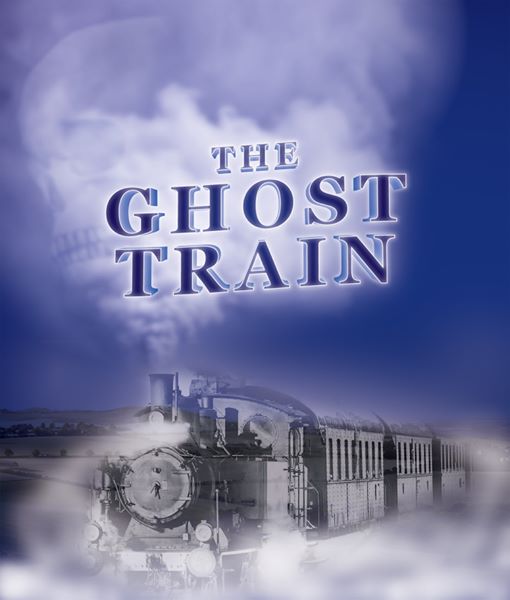
H is for Henry V
Outdoor theatre now.
One of Dartington Playgoers many Shakespeare productions in the private garden at Dartington Hall.Directed by Leon Winston and with an excellent cast this was a fine production – but the weather was not always fine!
I was originally – with James doing special effects for battles, fire lit camps etc, but the expected lighting operator did not materialise so a quick learning curve on a computer board for the first time and I was ‘ promoted’. Our youngest came in to assist James with smoke machines and Angela decided to join us all and help with men’s costume changes.
The weather was OK for the performance but on the Sunday in between the heavens opened and I had to dry out (thankyou WD40) every 15 amp plug in the circuits.
The maroons supplied for the battle noise were the loudest you have ever heard – though they were marked medium! We also had an unexpected visit from a hot-air balloon which descended briefly to look at the proceedings.
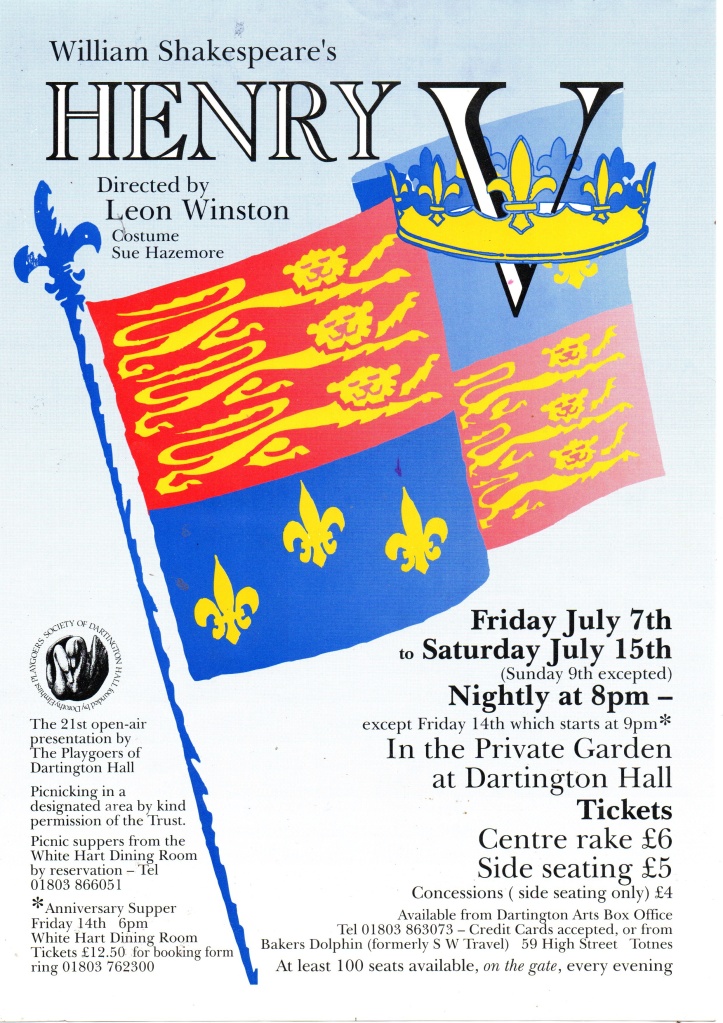
I is for (An) Inspector Calls
One of JB Priestley’s ‘best plays.
I was involved in a Bijou Theatre Productions version a few years ago. I was stage manager and helped Roger Bloxham with the building of what was a great set of an Edwardian dining room. The set was dressed by Angela..
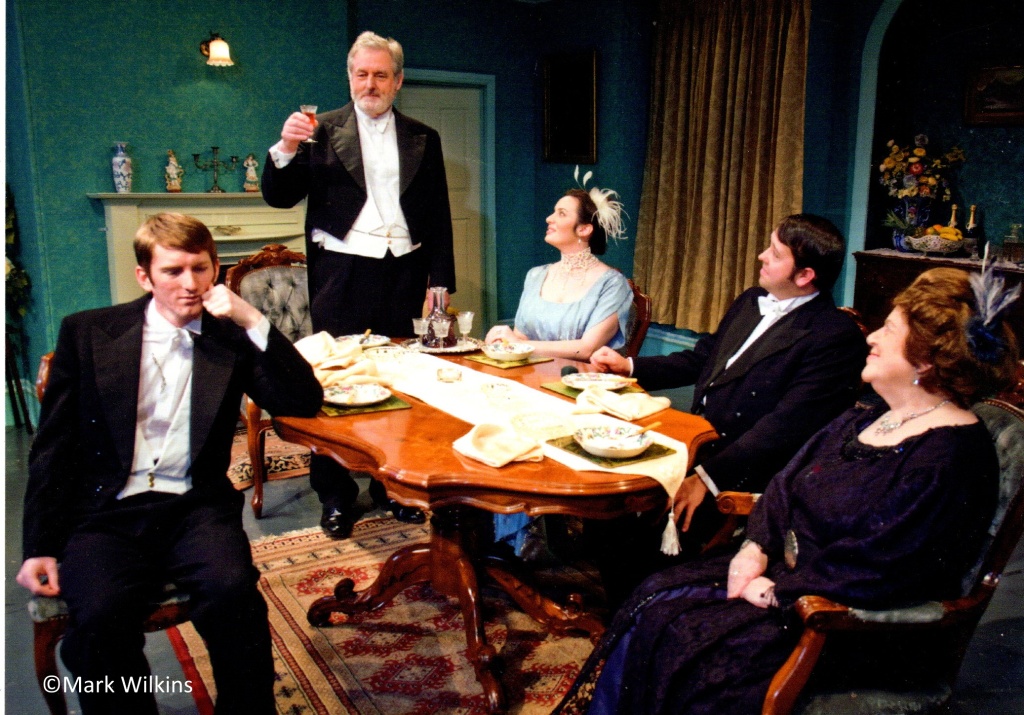
The play revolves around a northern family, visited by an Inspector Ghoul who questions the family about the suicide of a young girl. It appears they all have some connection – but who is the Inspector? There is no-one of his name in the local force.
J is for Jack and the Beanstalk
Back to pantomime.
I have done ‘Jack’ a few times but this is another from Kingswear back in the 90’s.
Kingswear Hall stage is quite small. both in area and height so there was no real prospect of ‘flying’ a beanstalk. The obvious solution was a horizontal beanstalk, held at each end by a stagehand while the characters pretended to ‘climb’! It seemed to work!
We always got a good review in the Herald Express as the writer was a former Chairman of the Parish council who may have been a bit biased. His only criticism was an annual – SPEAK UP A BIT!’
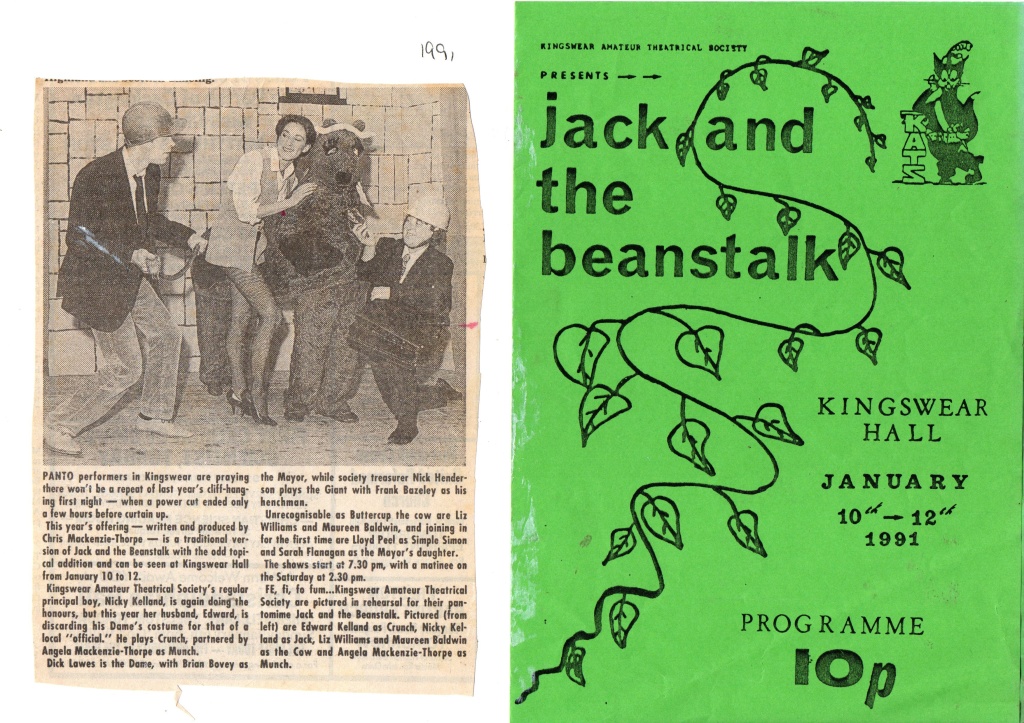
K is for Key for Two
This farce by john Chapman and Dave Freeman I have staged managed twice as per the two pictures – both for Bijou. The common denominator is Ian Cooper – appearing in the first and directing the second, The problem for the set builders fir a farce is DOORS. You always need more than usual and trying to get them to stay open or closed on the Palace Theatre’s raked stage has driven many of us – especially Ian Caplan – to distraction.
In the second show we had Andy Killen Rachel Saturley Stephanie Austin Martin Austin and the much missed Yvonne Tilley. Tim and Susie Stubbs can also be seen in the photo.
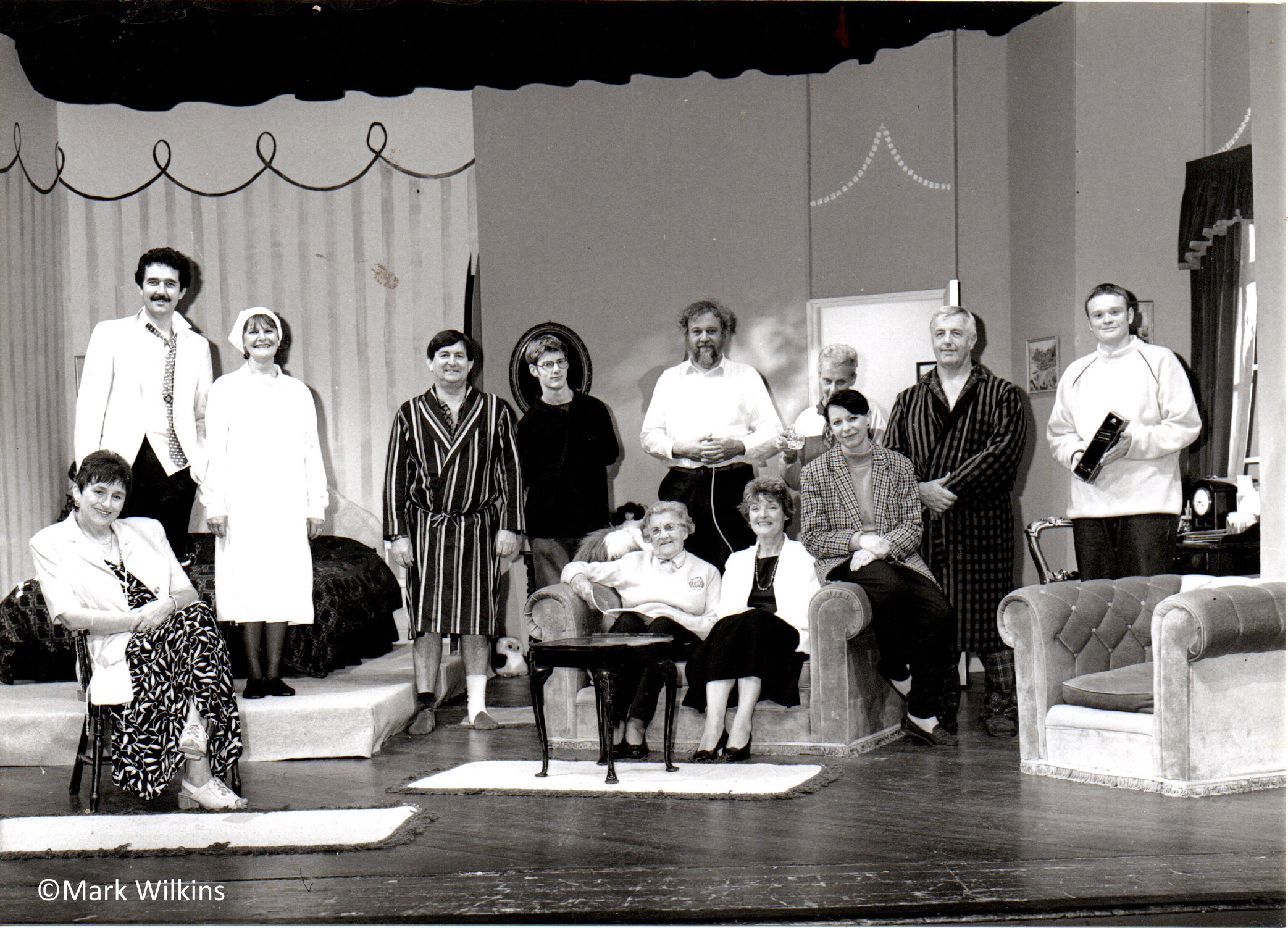
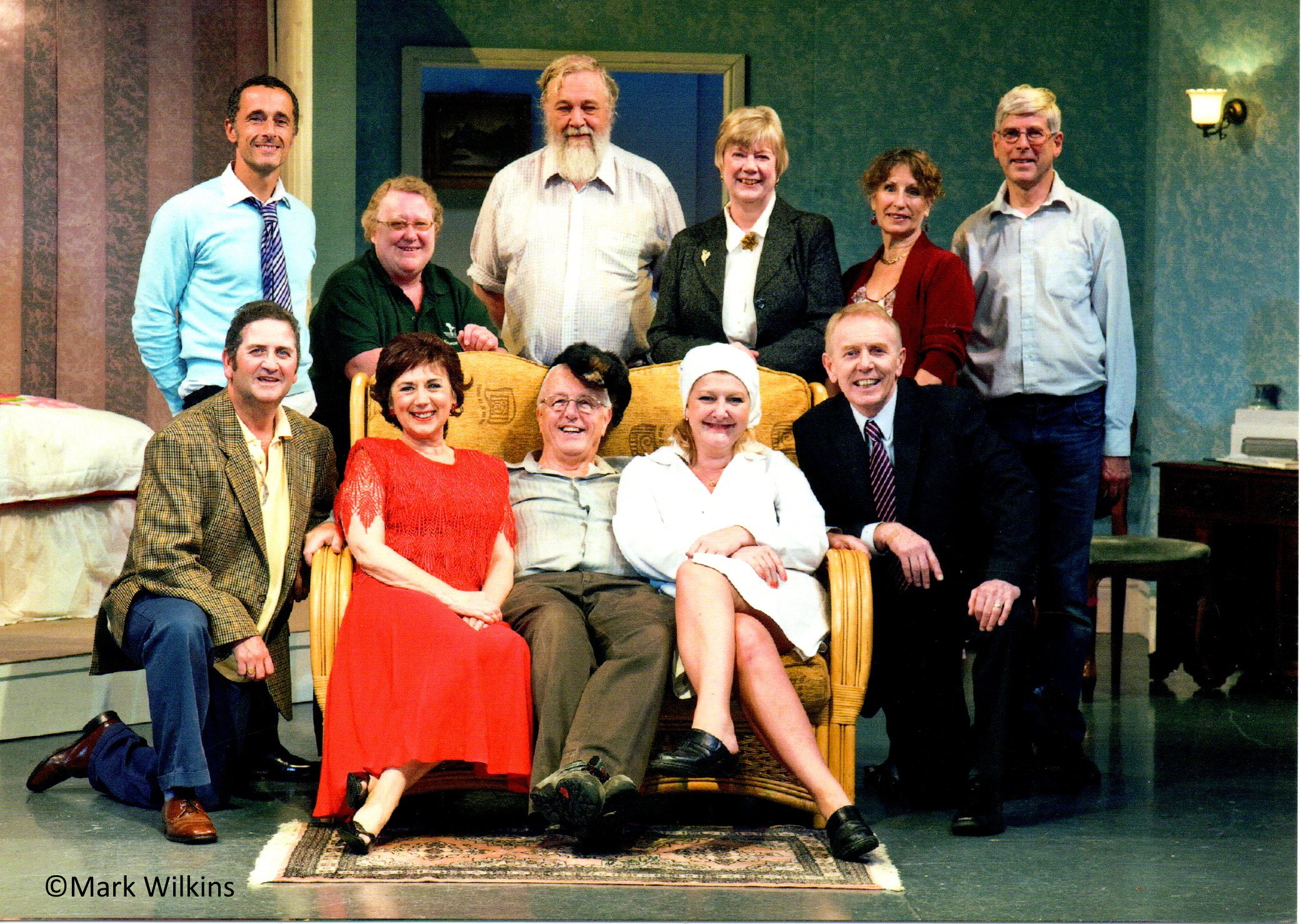
L is for Last of the Summer Wine.
A Bijou Theatre Productions play I was looking forward to – and indeed was in it. It was a good production and funny but perhaps didn’t transfer to the stage as well as say ‘ Vicar of Dibley’. All the usual characters were there – played by some usual suspects.
Andy Killen was Compo, Colin Baker Clegg, and Stuart Sutherland was Foggy. They were joined by Yvonne Tilley as Norah Batty. Trying to ride a bike on stage at the same time as acting drunk was interesting! Also it was one of my first sets for Bijou and I was quite pleased with my interpretation of Clegg’s front room.
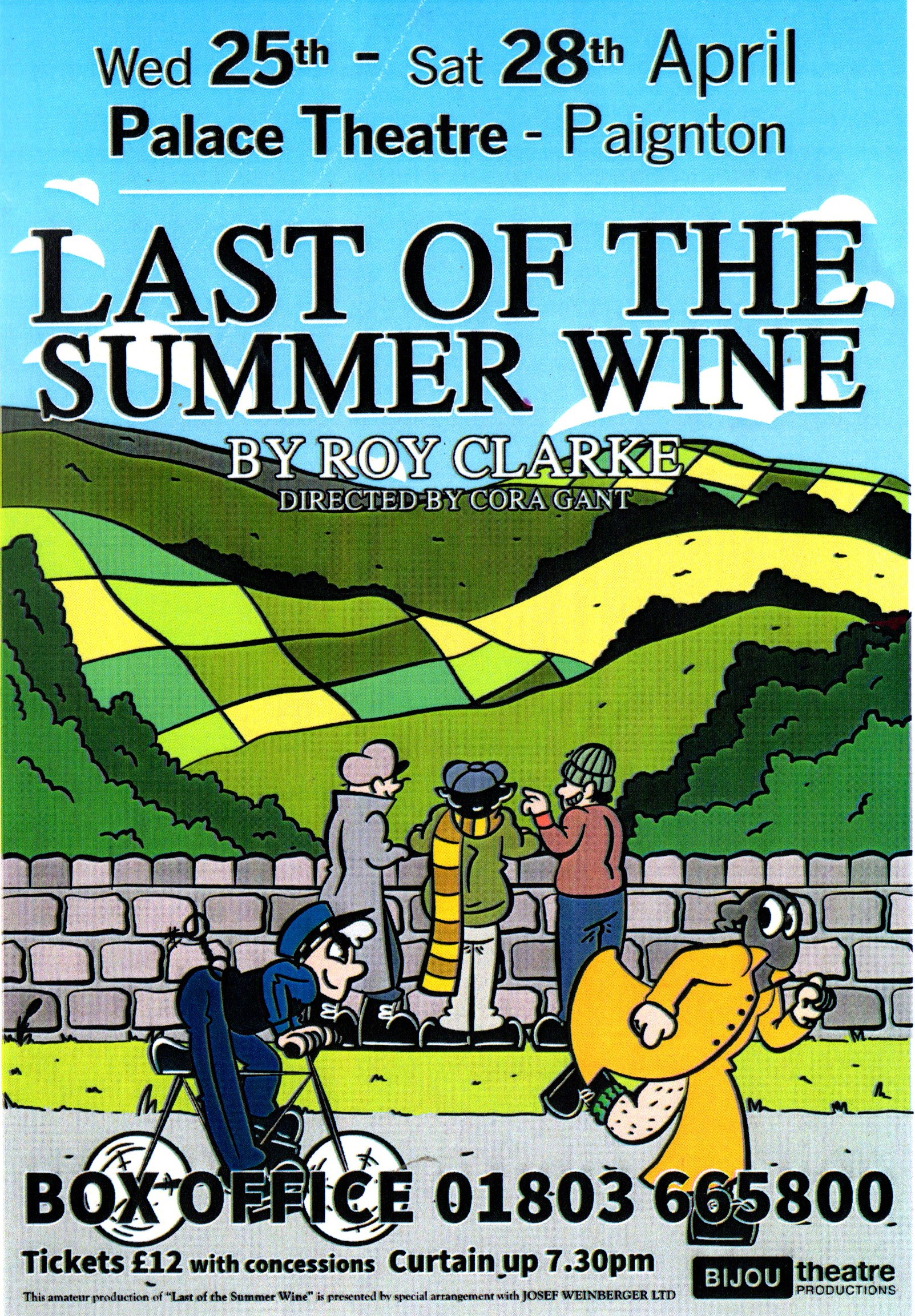
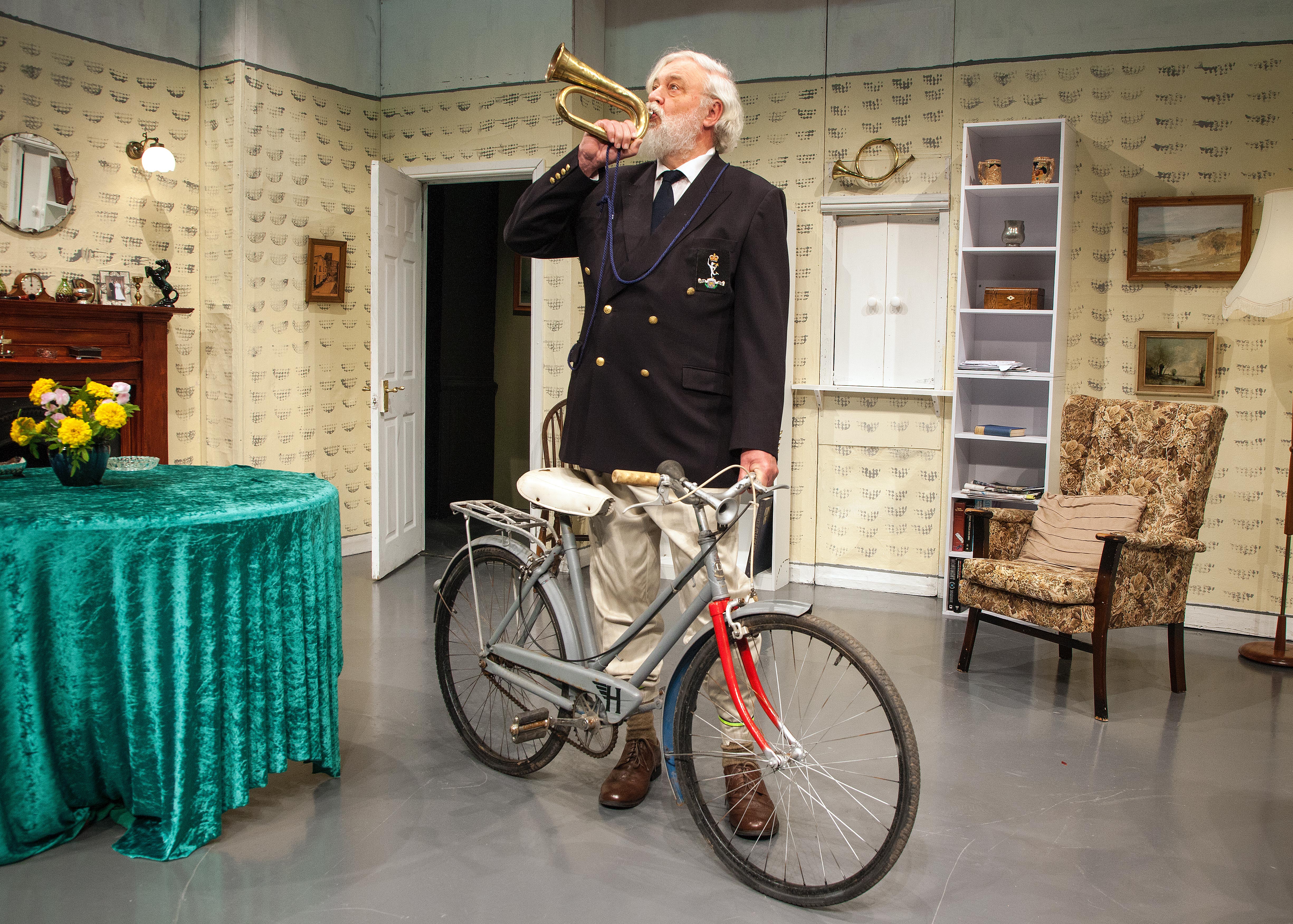

M is for the Scottish play! i.e.Macbeth
Certainly my favourite Shakespeare – probably because it was my fist real acting part at school. I also learnt a lot abut backstage work – props – effects -music. It was more than 50 year ago and I played the part of young Macduff -horribly murdered by Macbeth’s men.
In the Dartington production James played the same role. The Dartington Playgoers version was certainly different with 27 witches (3 times 3 times 3!), unlike the school production which followed the traditional way.
I have also seen a few professional versions including Paul Scofield at the the Old Vic in 1967 and another at the Northcott, Exeter.
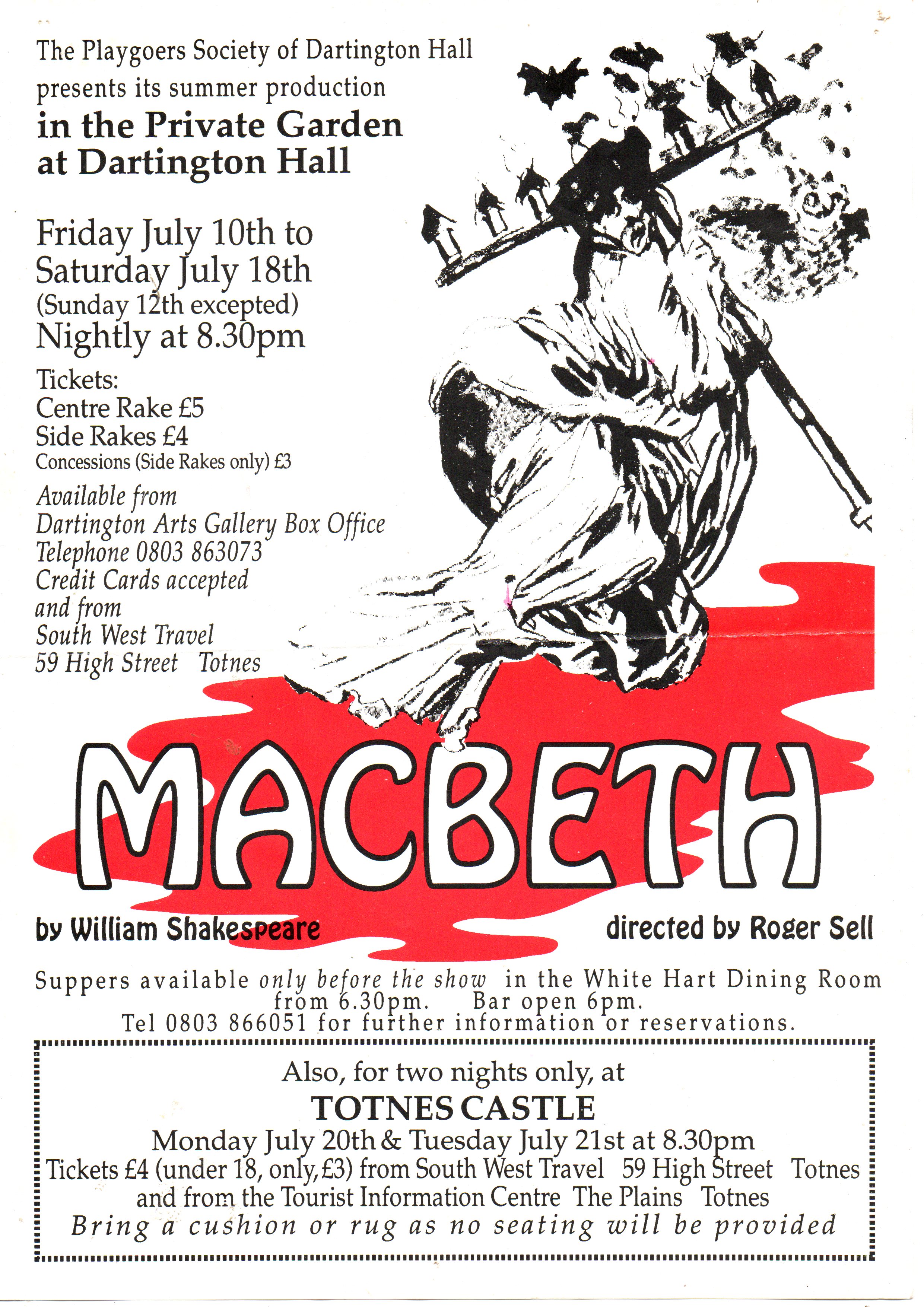
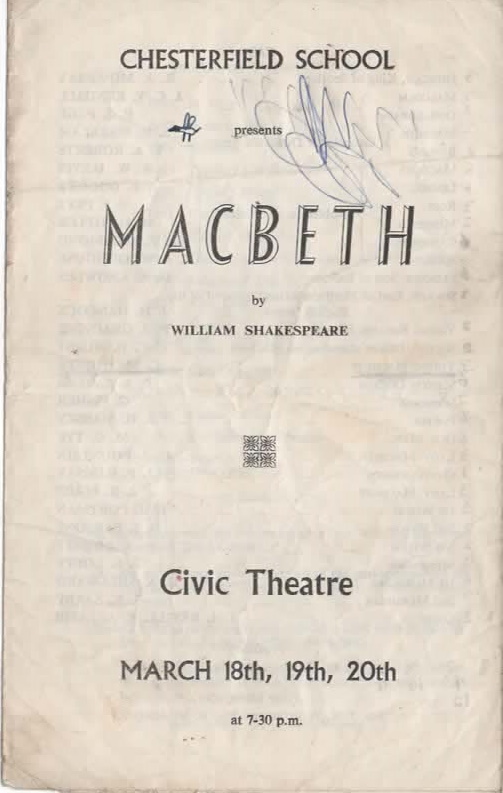
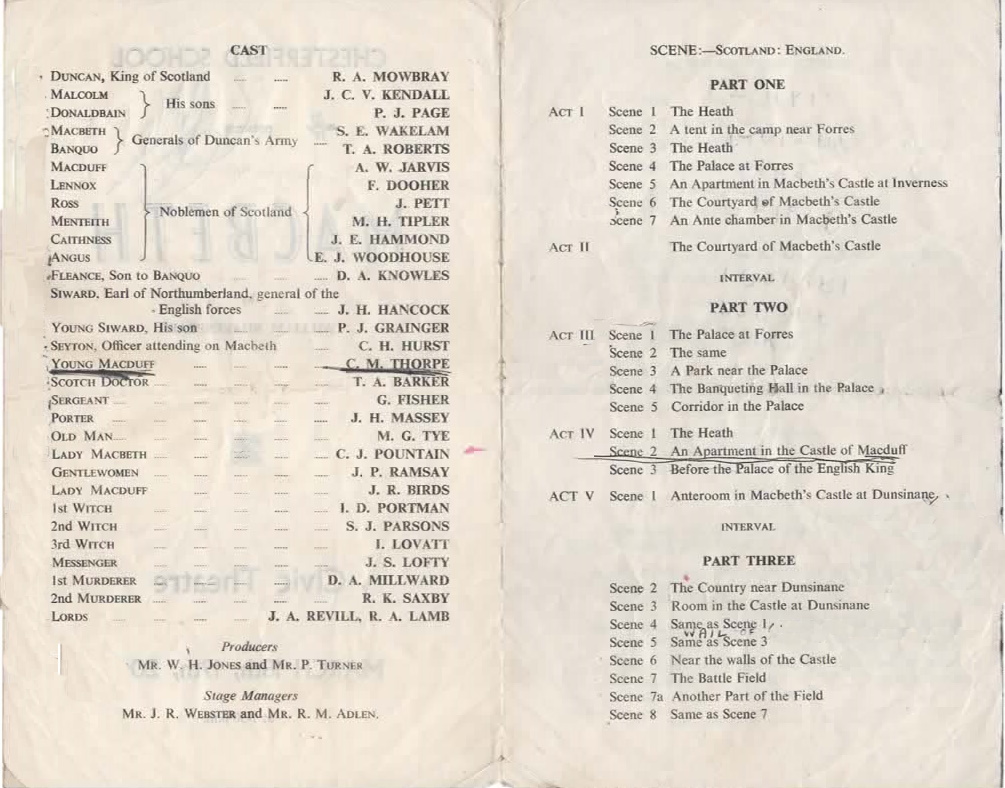
N is for Noises Off
This very funny Michael Frayn play was my stage management ‘debut’ for Bijou Theatre Productions and something of a baptism of fire. The play requires 2 different sets – 1 for Act One and Three, and a one for Act Two. Big theatres may have a revolve making it easy but the Palace Theatre required the ingenuity of Ian Caplan to ‘add’ an set in the first interval and take it away in the second. Thoroughly enjoyable start to a long and continuing association with Bijou. Also notable for the first use of the f-word in a Bijou production!
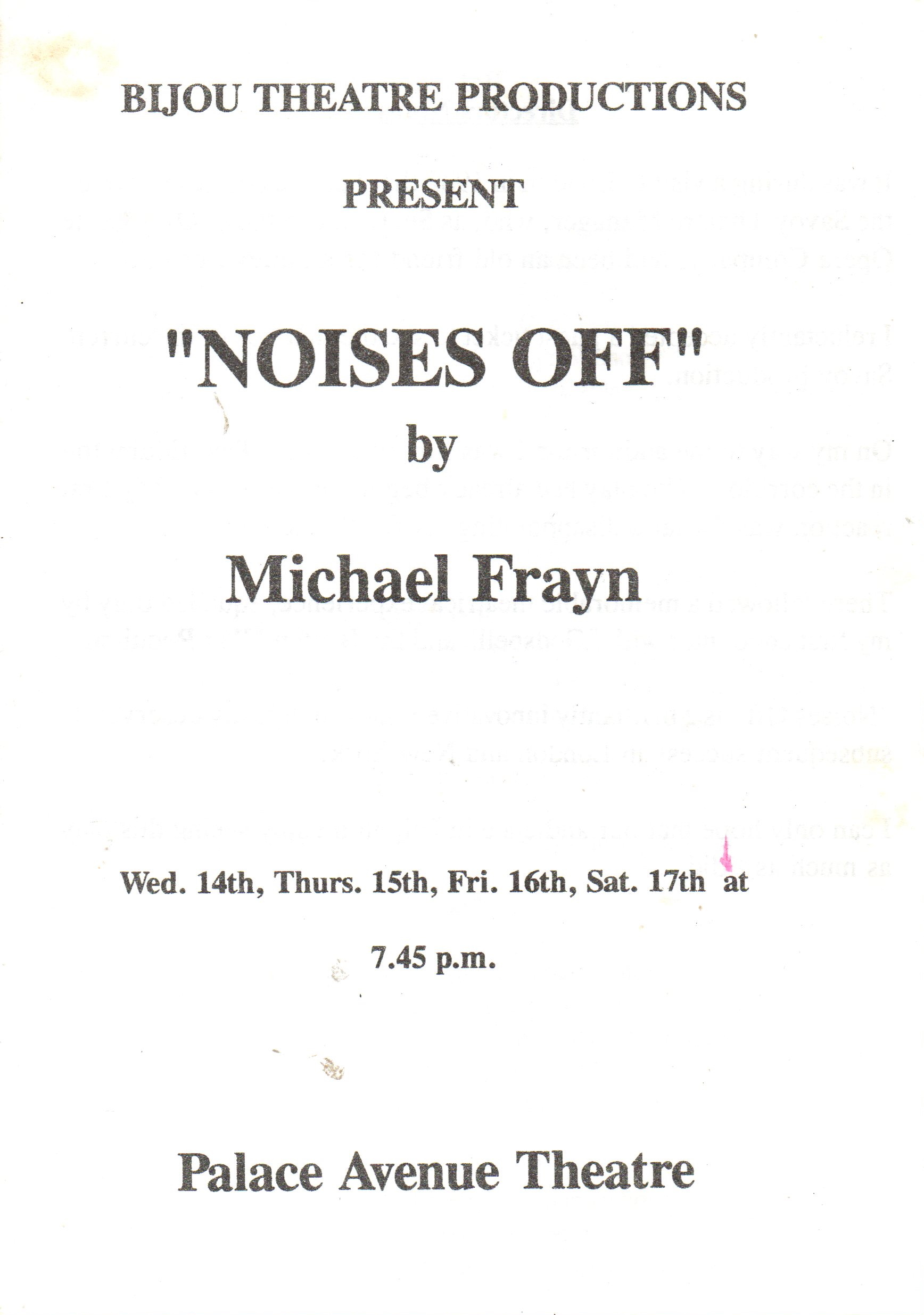
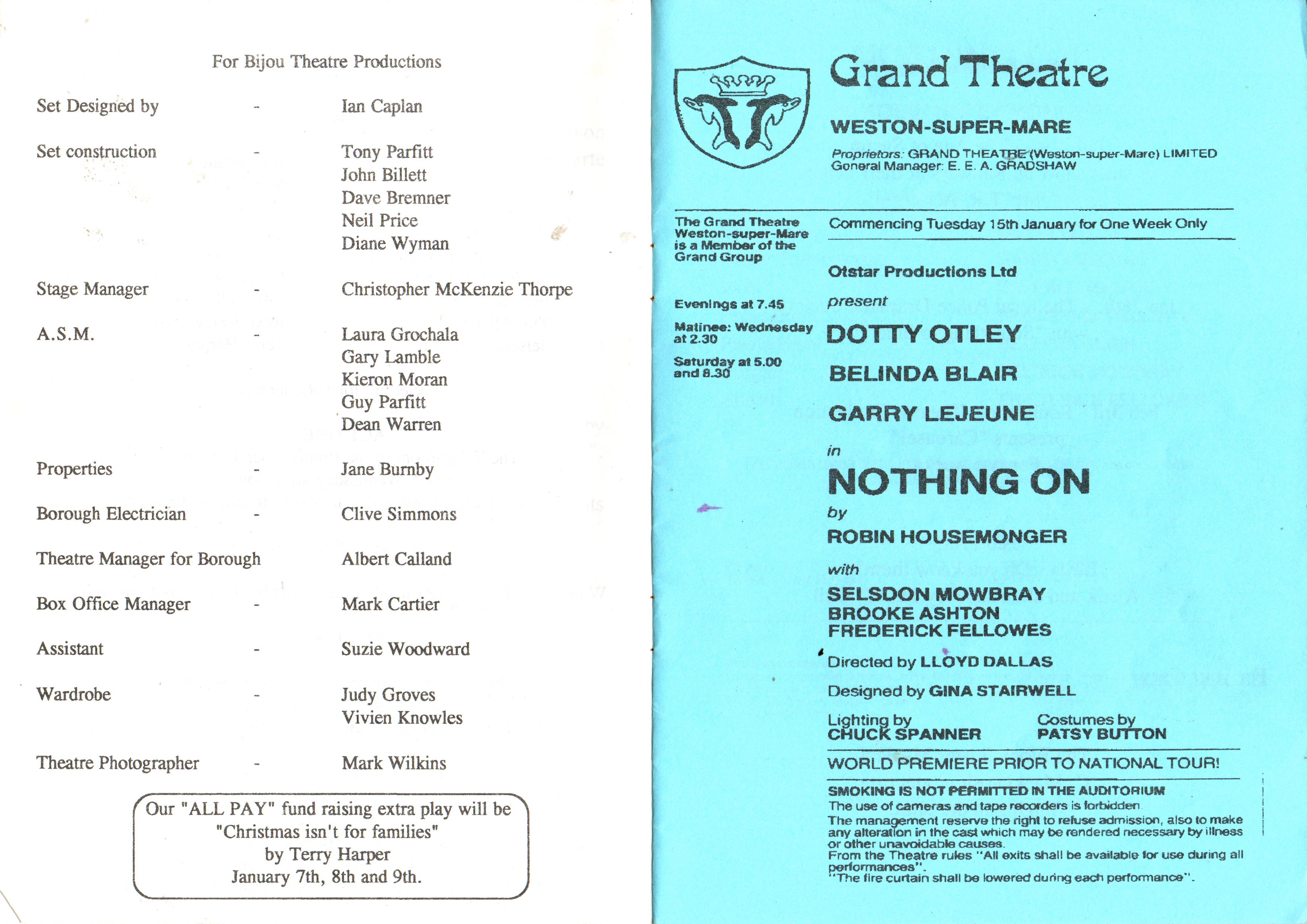
O is for Oklahoma!
A musical I have been involved with twice.
In 1988 I was Deputy Stage Manager to Simon Bennett in the BOADS production at Brixham. A fairly traditional production but very good all the same. Notable for the dress rehearsal when the band got the National Anthem wrong and the MD insisted on stopping them and starting again. Simon not impressed as he was timing the show. Also at the dress I got rather enthusiastic with the smoke machine in the ballet scene and the band and the first 3 rows were invisible!
In 2002 I stage managed a Paignton Operatic show directed with his usual style by Mark Cartier. Well designed and lit and very successful.
There was a common denominator in that the late Peter Randall – then Dartmouth town Crier – played Judge Andrew Carnes in both shows.
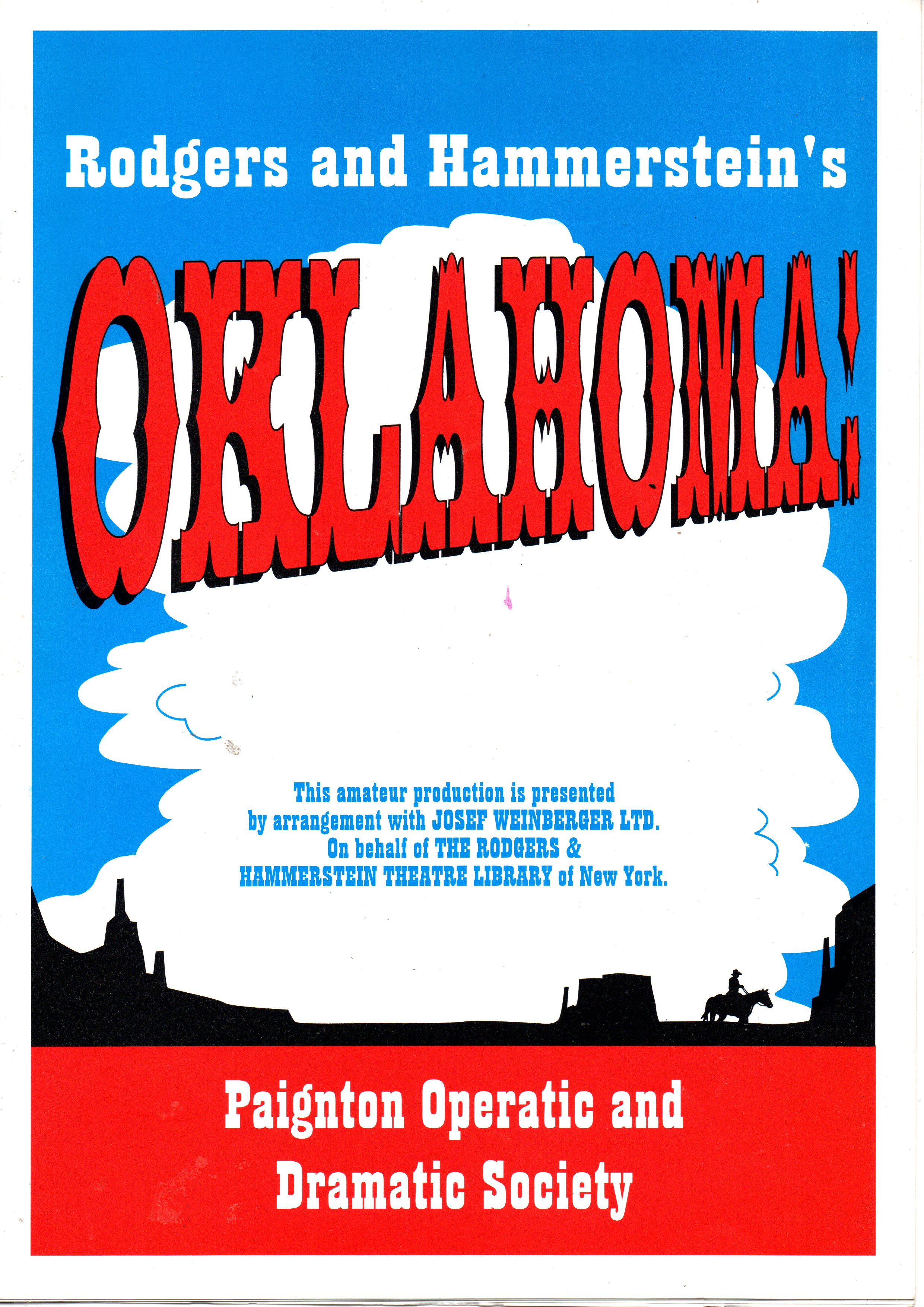
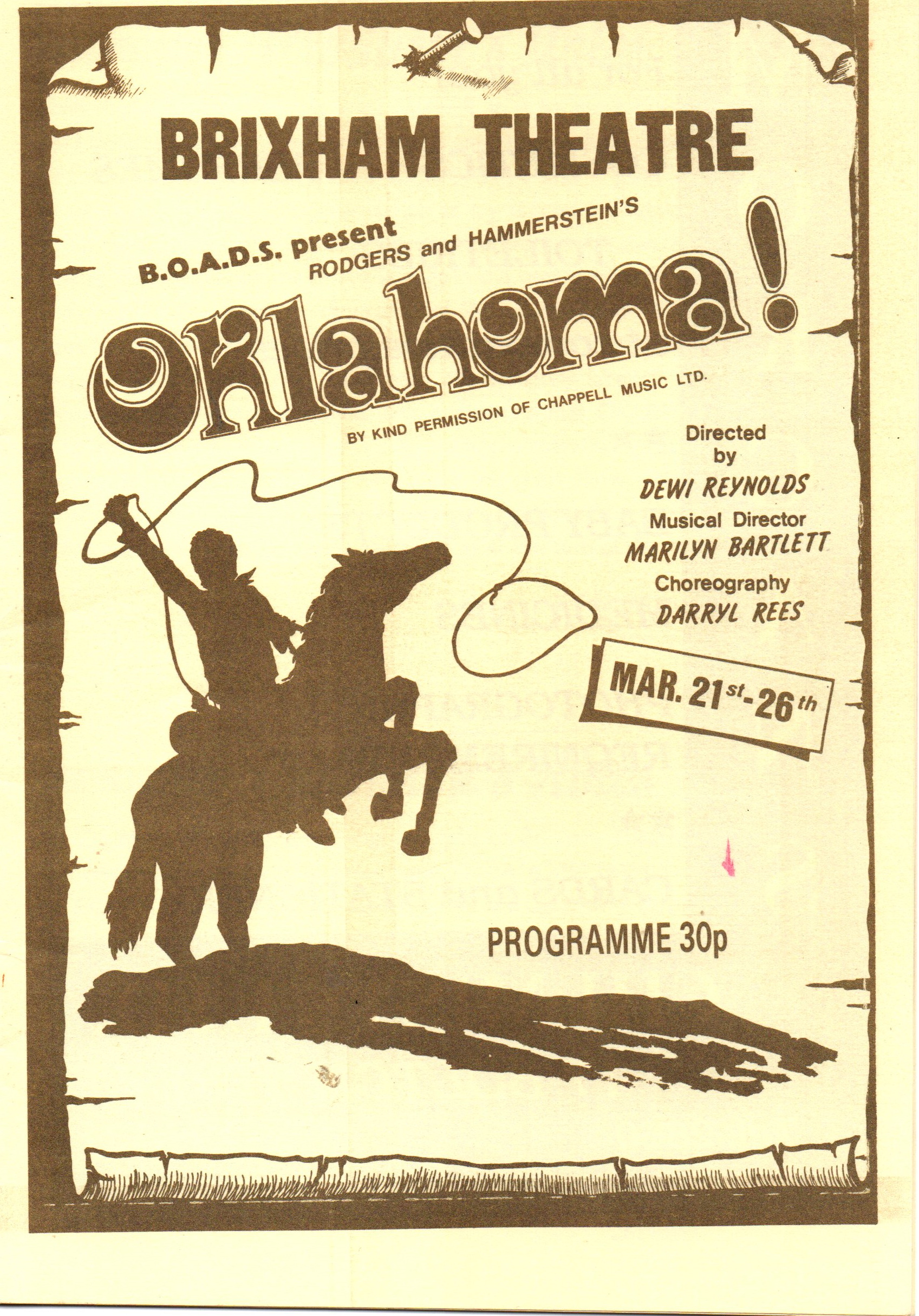
One of my favourite musicals.
P is for (The) Provident
Something quite different. The Provident was a true Brixham Community play, written by David (Spud) Murphy, produced by Phil Trayhorn and directed by John Miles. . The cast came from all parts of Brixham. Rehearsed at BOADS rehearsal room. A real collective effort.
Andy Killen was there again with Graham Mewis who had been in the Brixham Oklahoma! -see under’O’ .Gordon Smith as a chief petty officer and I got to play a Commander.
The story of the Provident centres around New Years Eve/Day 1914/15 when the Brixham trawler went to the rescue of the crew of HMS Formidable, sunk by a German torpedo. The trawler crew were awarded medals at Buckingham Palace by the King.
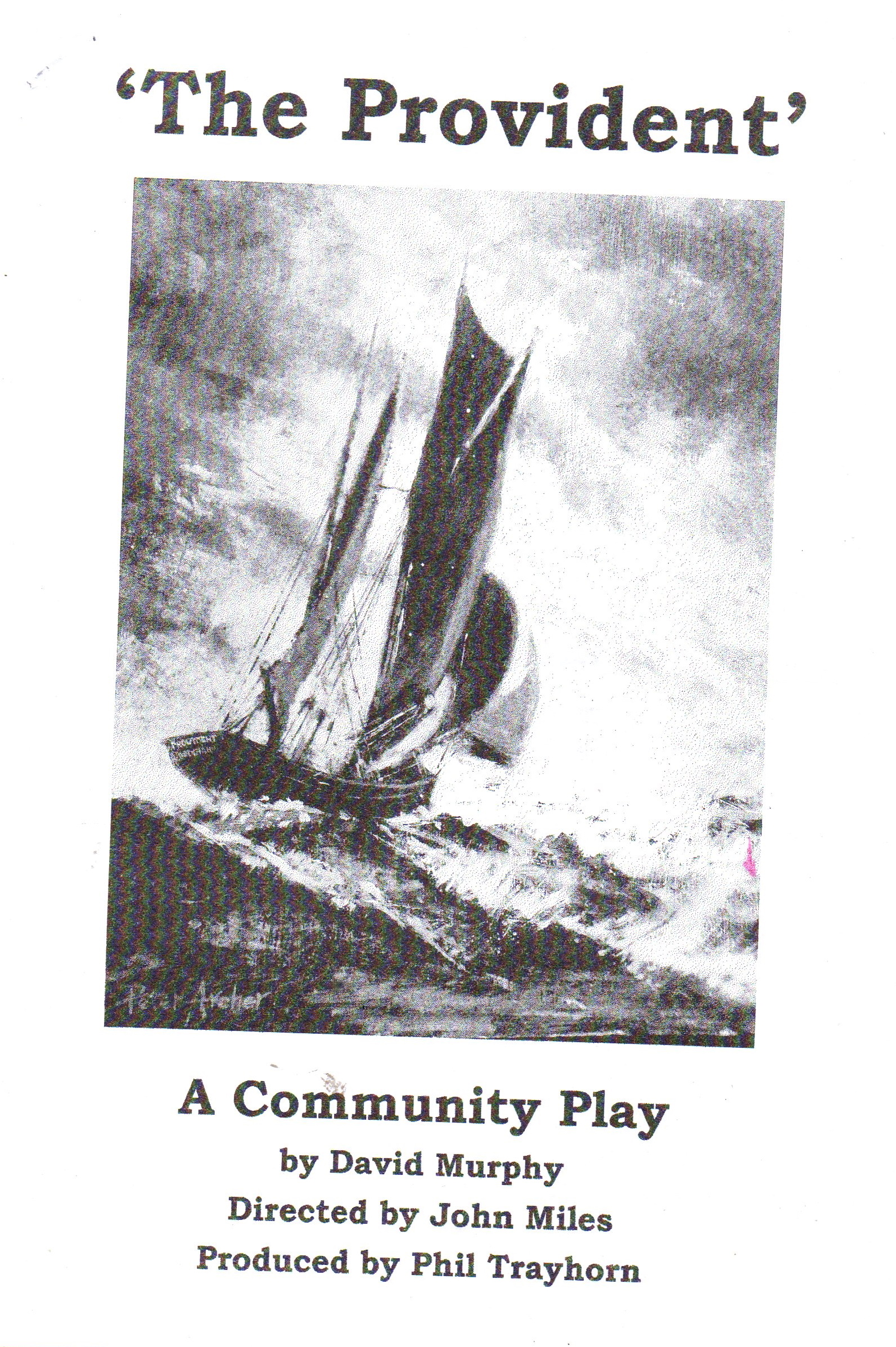
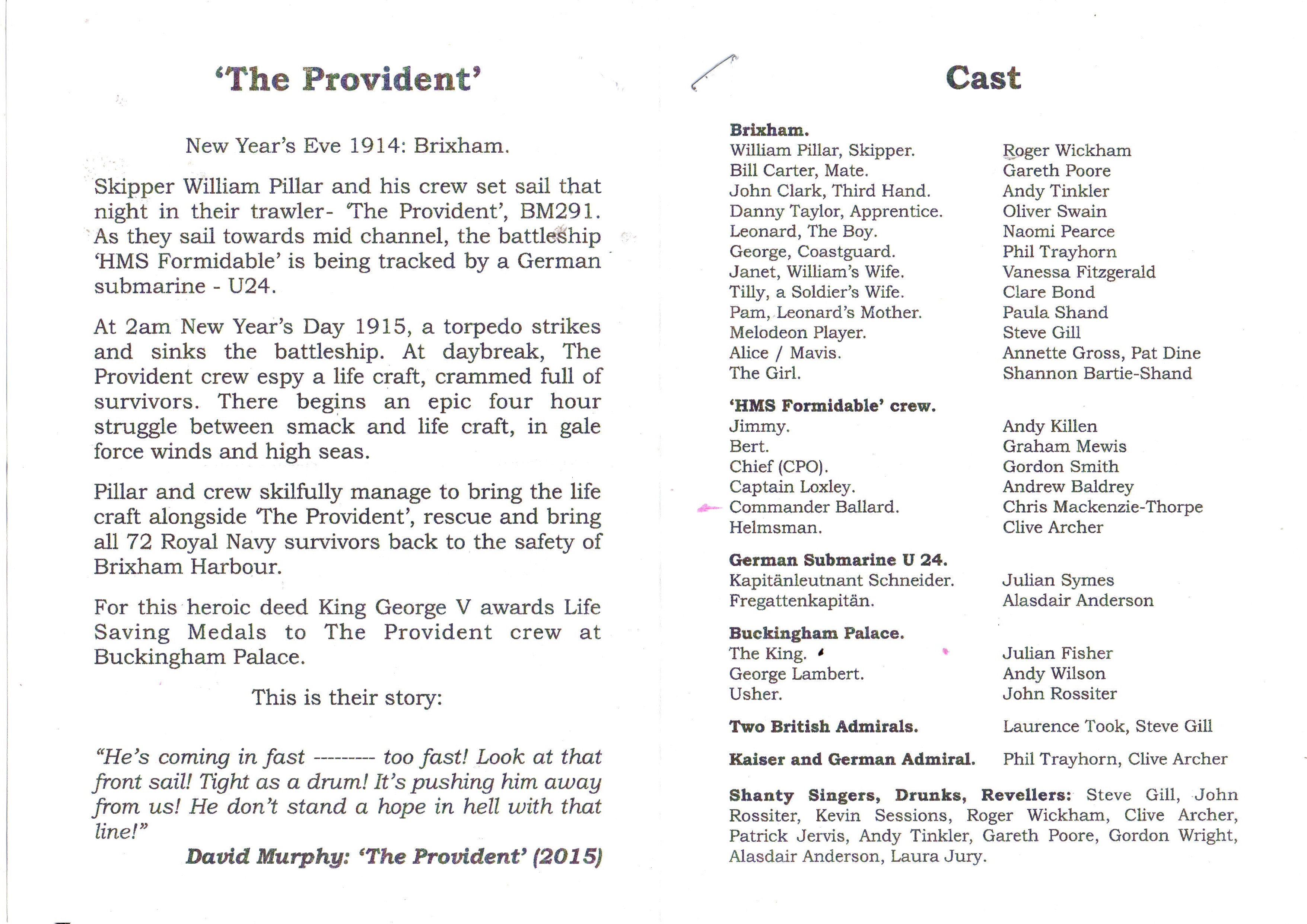
Q is for Quartet.
One of two very good plays I have done from Ronald Harwood. I will come to the second one later.
Quartet tells the story of four residents of a home for retired theatricals who are persuaded to perform together again to sing the Quartet from Verdi’s Rigoletto in honour of the composers birthday. It is not a simple as it sounds due to the history between the four of them.
The play has just the 4 actors with a couple of voices off and is set in a garden/music room of the home. A clever set designed by Roger Bloxham and directed by Ruth Bettesworth.
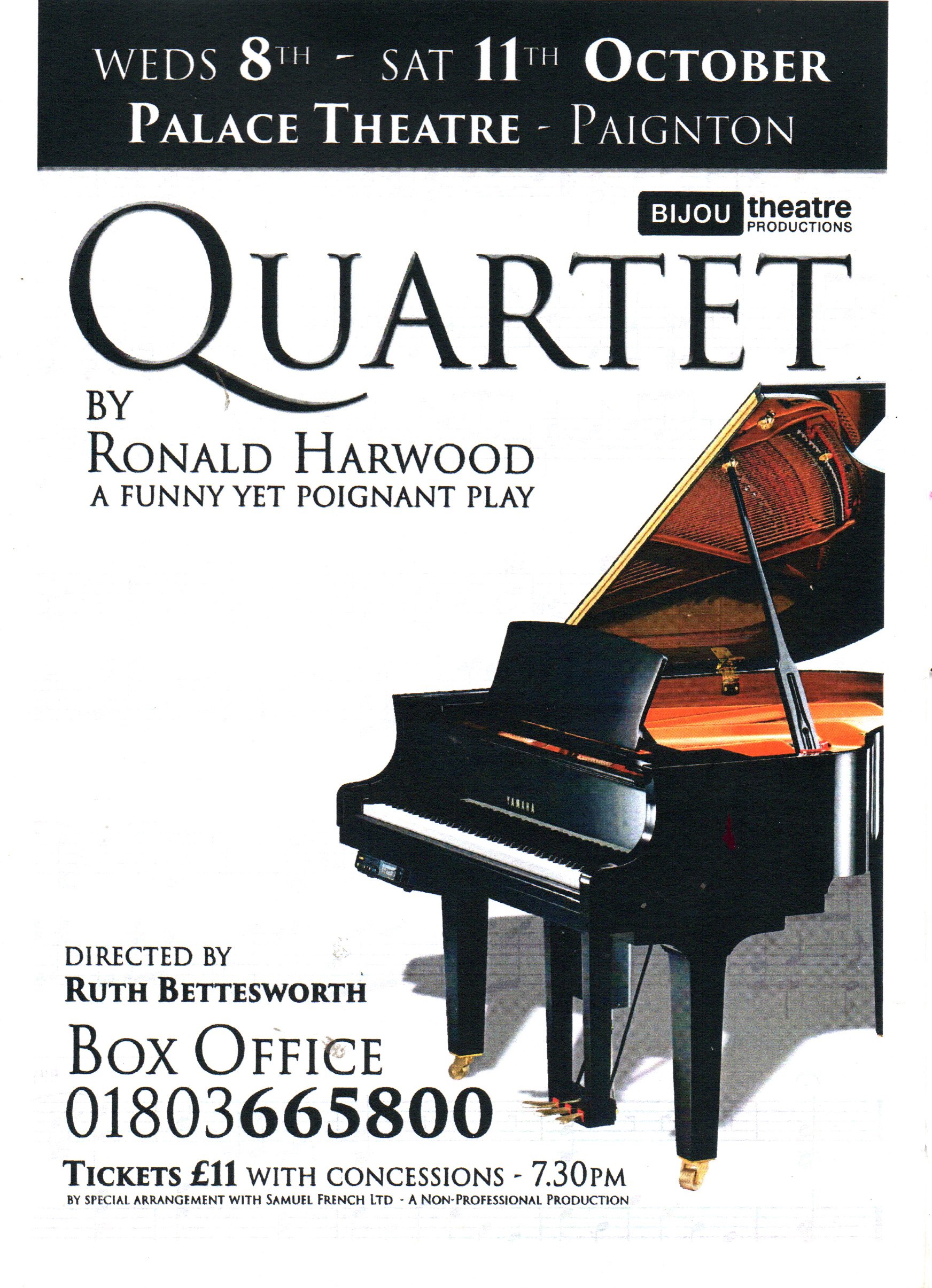
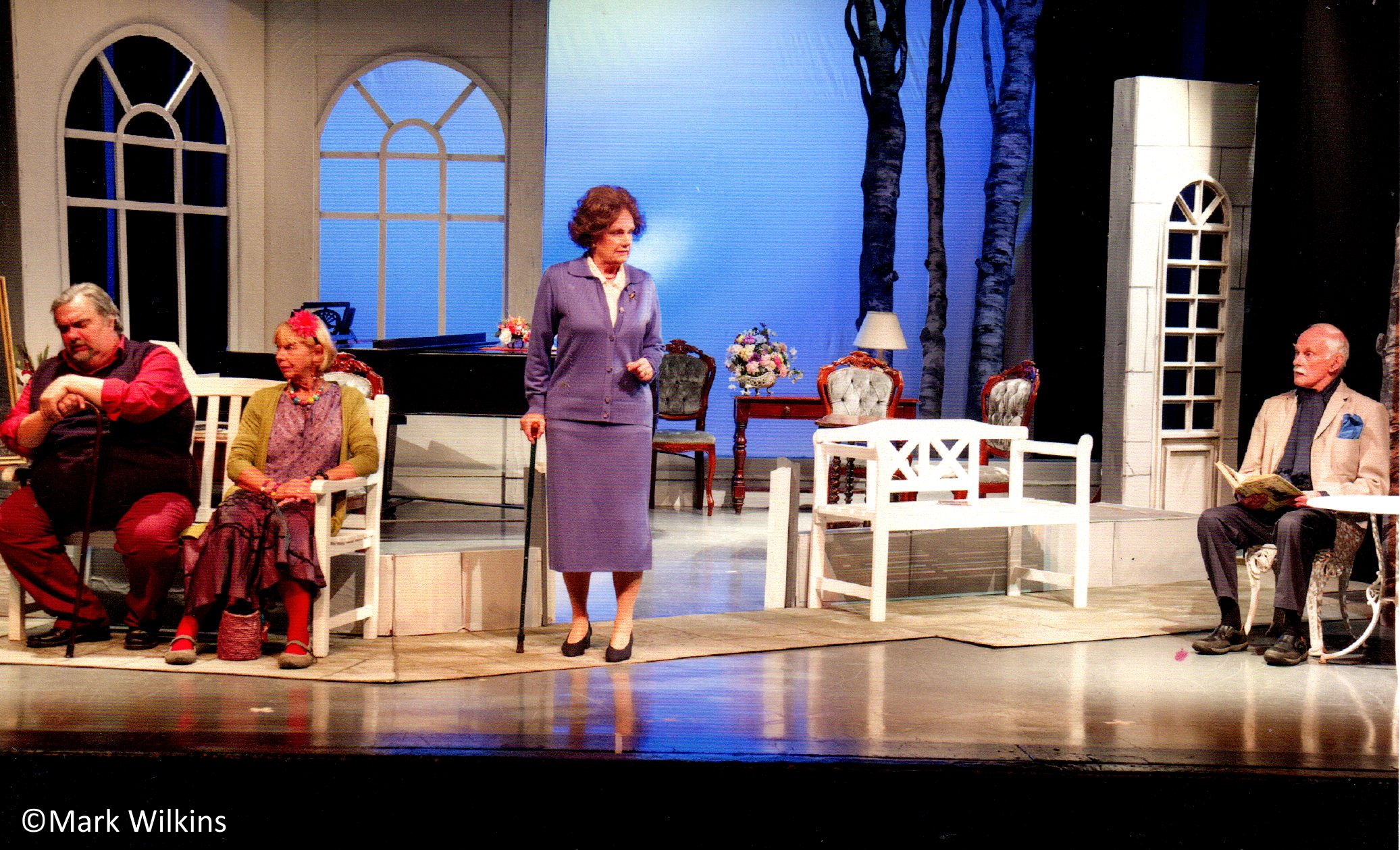
I recently saw the film version with an excellent cast but of course there is always the need with a film to expand from the simple stage setting and include more actual characters. Although still very good, it is not as effective as on stage.
R is for Relative Values
A Noel Coward offering by Bijou Theatre Productions some 23 years ago now. A typical Coward comedy reflecting on the mixture of Hollywood and the English aristocracy due to the wish of an Earl to marry an American actress. The staff at the stately home concerned also get involved.
The Bijou production was a little fraught. I was asked to be stage manager but as rehearsals began a few cast dropped out for various reasons. I ended up playing the character of an Admiral and James Mackenzie-Thorpe took over in the corner.
There are many recognisable faces in the photograph – including the Director Geoffrey Wildey.
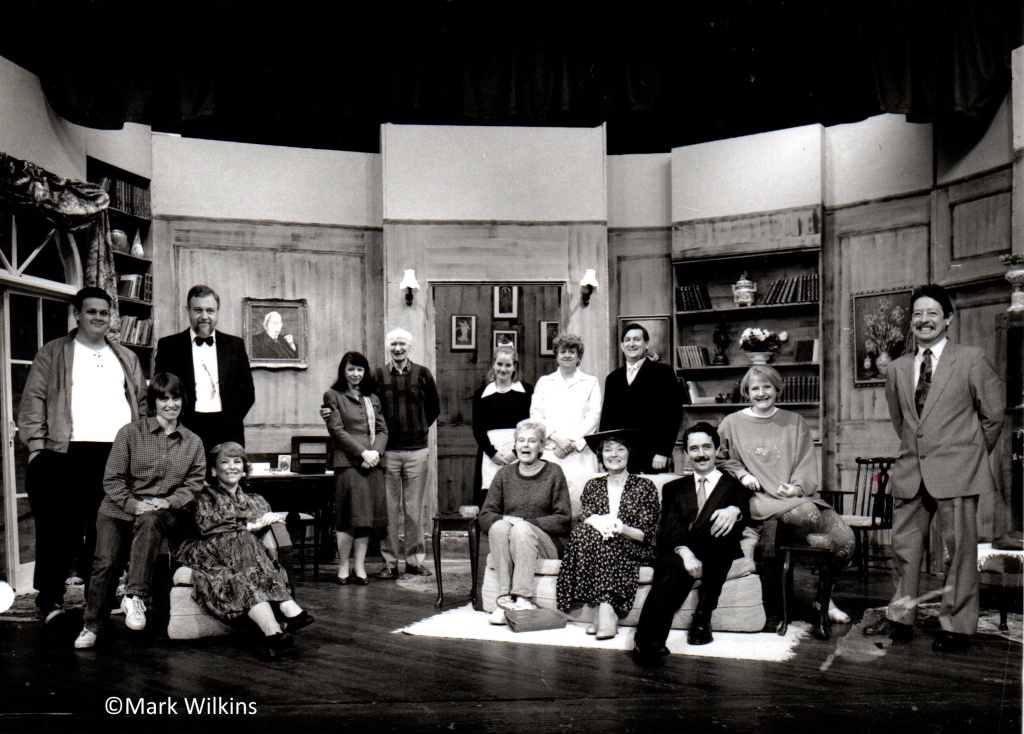
.S is for Spiders Web.
I had a serious choice for S but Spiders Web just won it over Shadowlands. The latter was many years ago and all 4 members of the family were involved.
Spiders Web is topical as it was to have been this years Bijou Theatre Productions
Agatha Christie but was postponed due to the pandemic. The production below was 7 years ago and this would have been my 13th Agatha! Unlucky- but we’ll be back next year.
In this production I played the genial Sir Hugo.
.
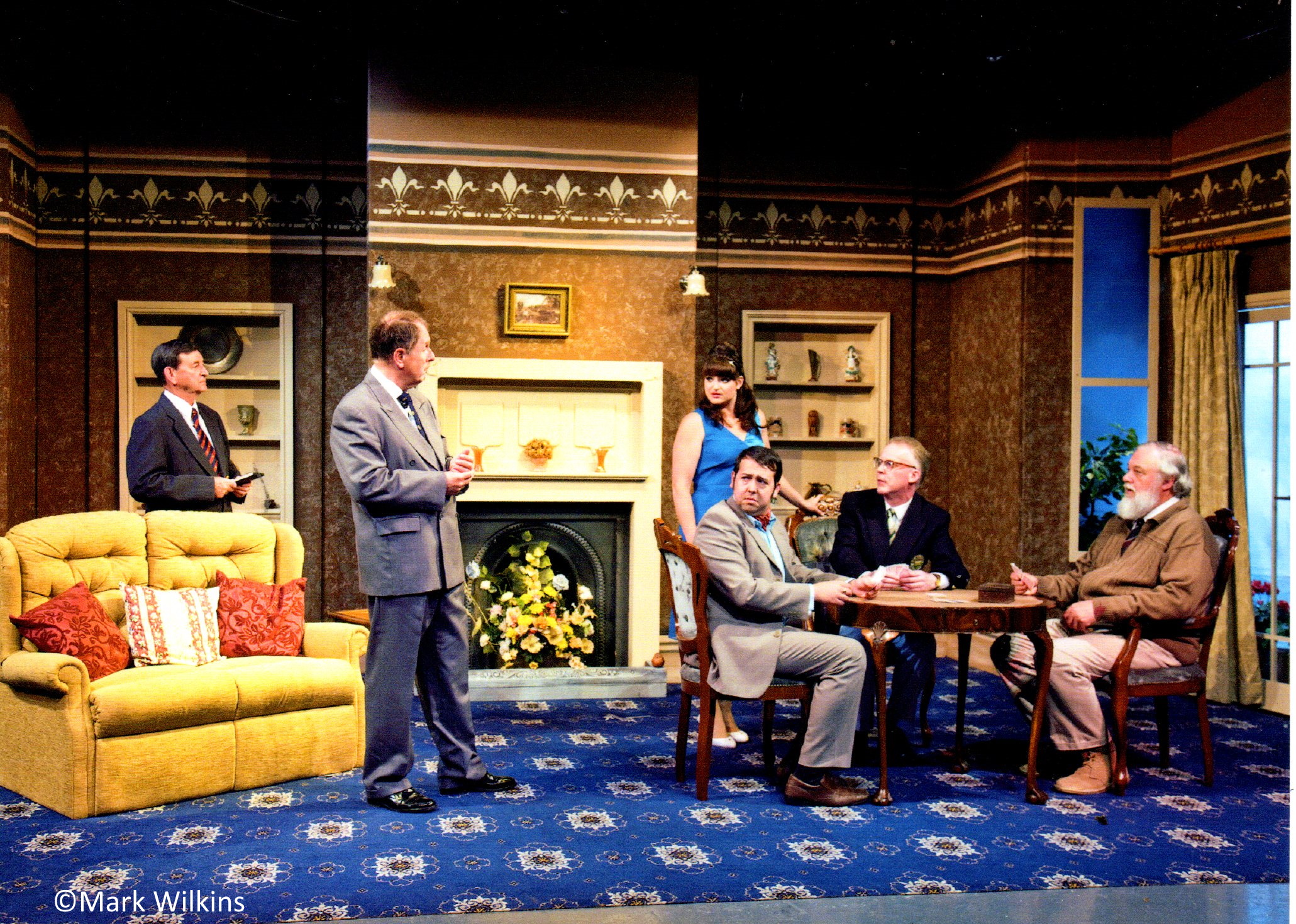

T is for Treasure Island.
Another Kingswear pantomime. When I set out to write I re-read the book only to find it wasn’t a belly load of laughs. My script took a lot of liberties with Stevenson’s original!
The best part of this show was that Rod Farrell – who will many of you have known as a rehearsal pianist – wrote a whole set of original songs – words and music, Very good and funny. two memorable ones were ‘Walk the Plank’ and ‘Cheese’ – the latter written for the part of Ben Gunn.
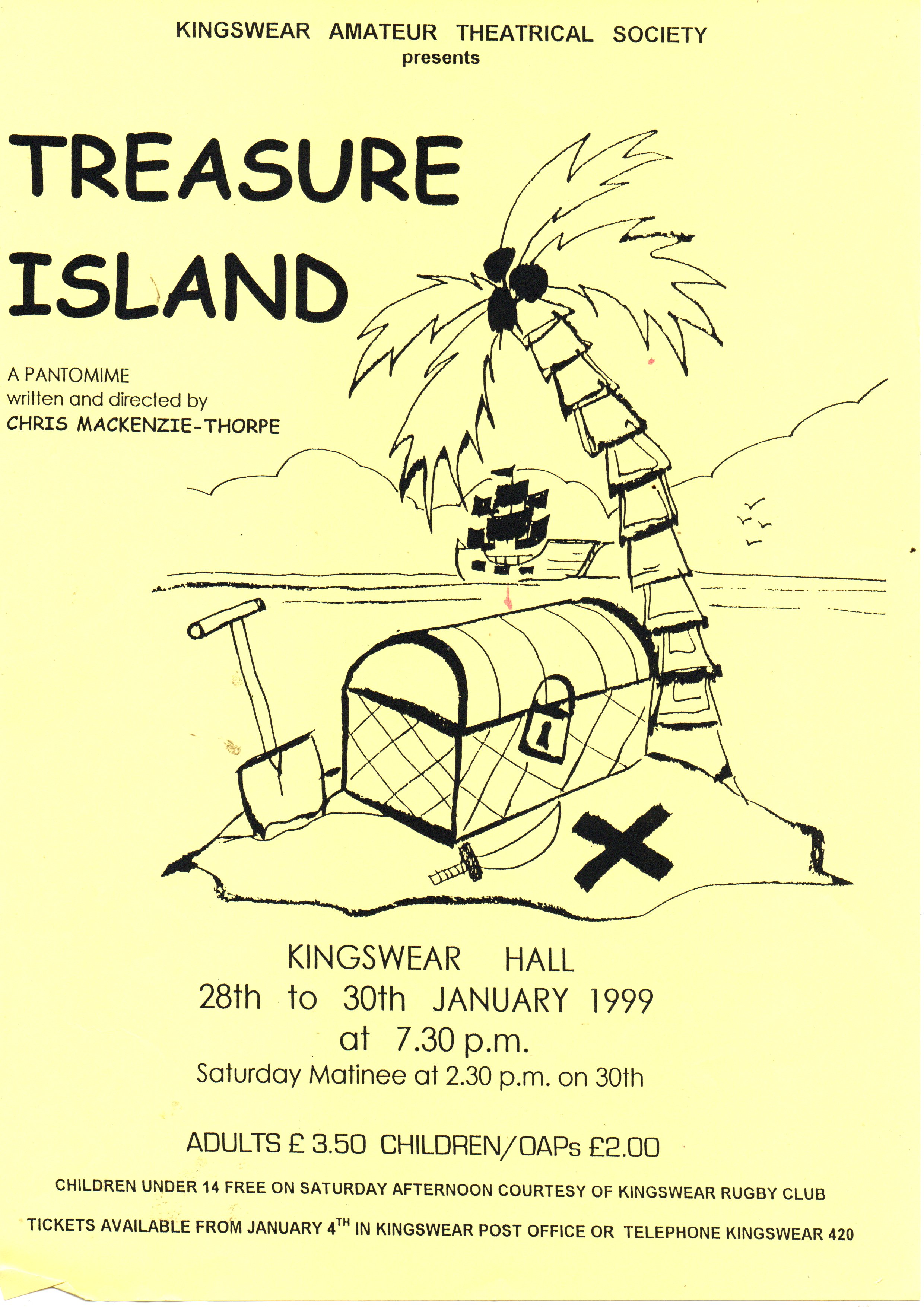
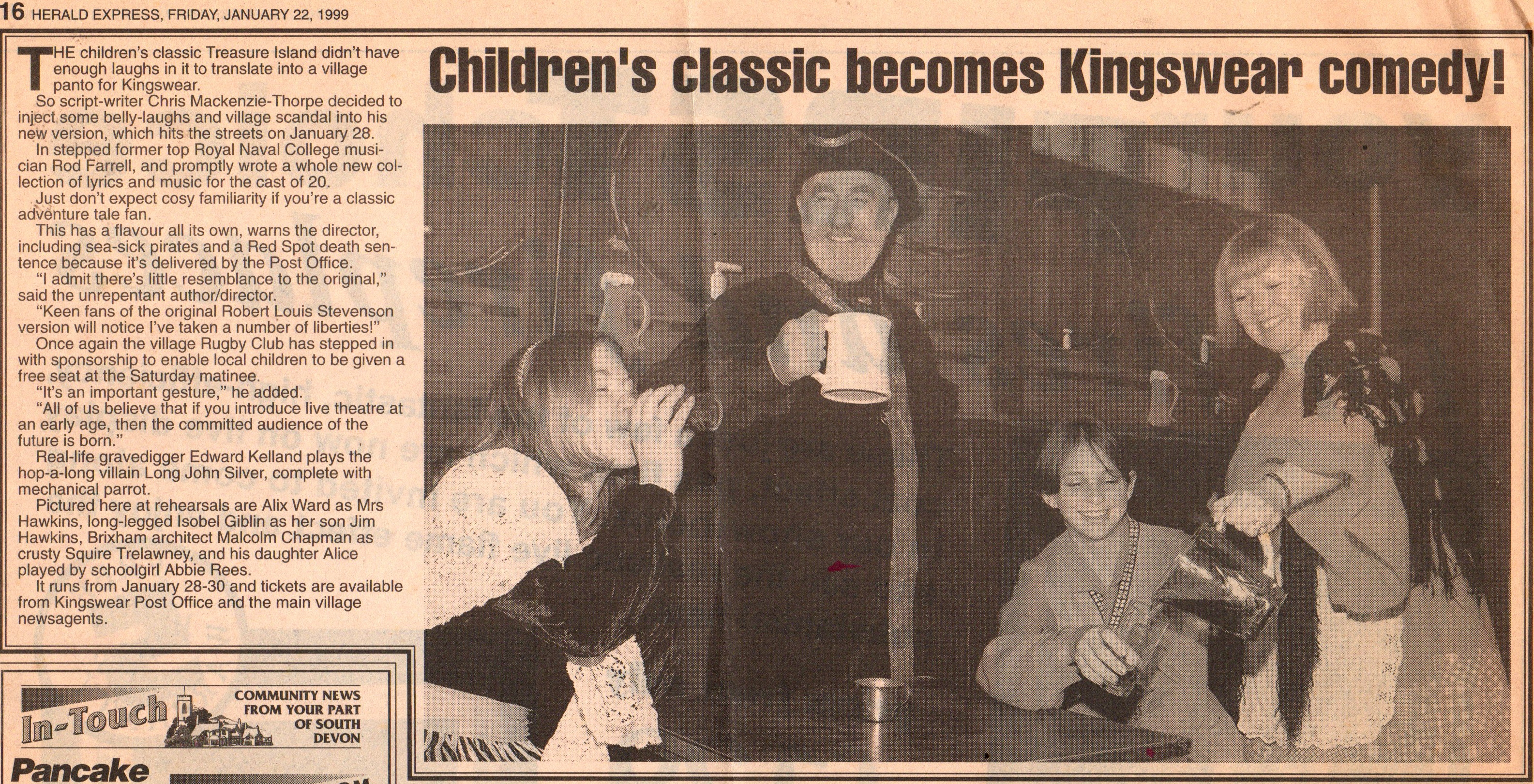
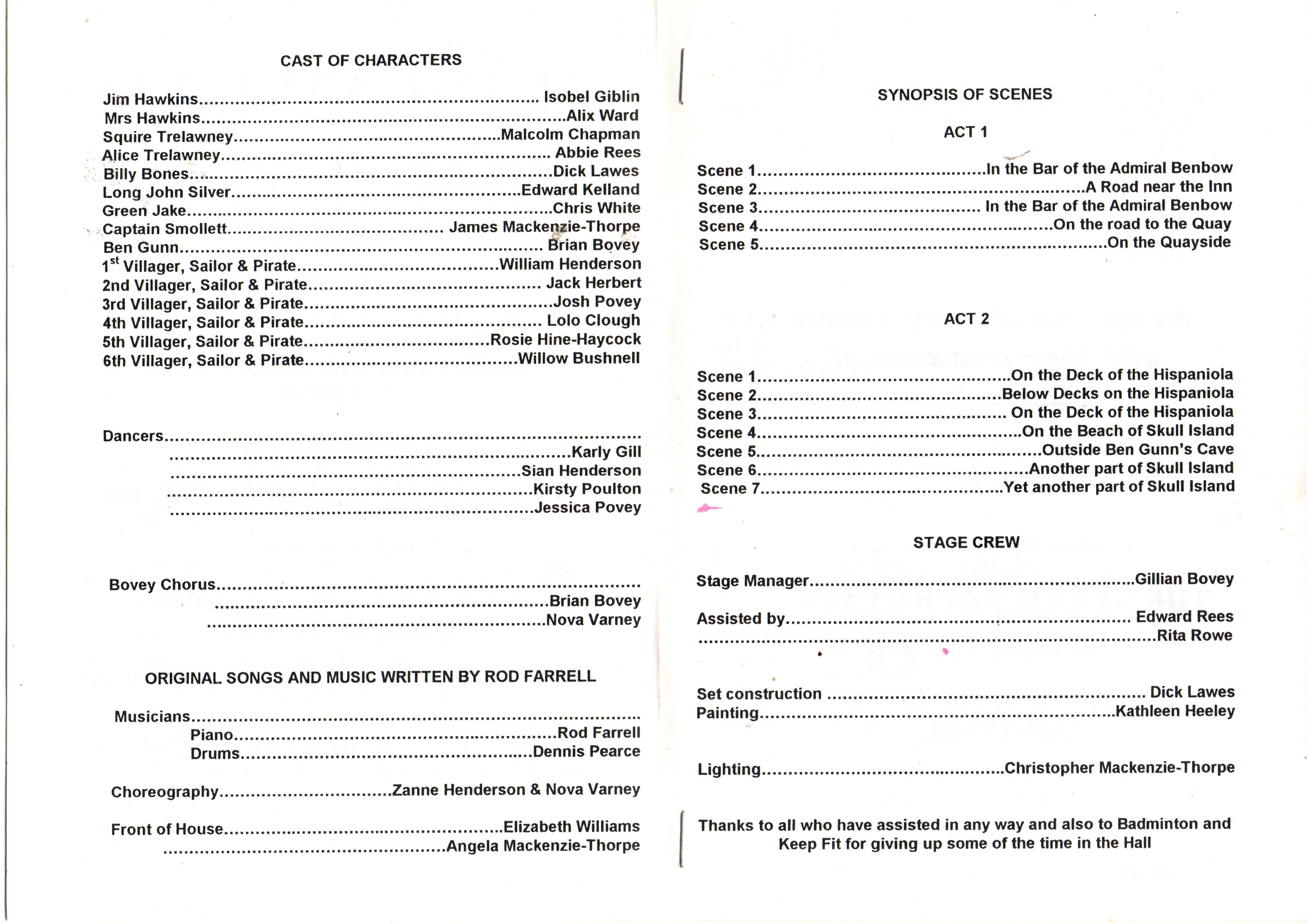
For any locals in Kingswear who read this there are some memorable names in the cast. In the picture the main man is the late Malcolm Chapman of Brixham.
U is for Unexpected Guest.
An Agatha regular as I have done it 3 times with Bijou Theatre Productions
On the first two occasions i was the ‘body’ as the curtain opens to find a man dead in a wheelchair with his wife standing next to him with a gun. fortunately on both occasions I was facing upstage and did not suffer from other cast members trying to make the body laugh! for the rest of each show i was stage manager.
The man in the wheelchair had a male attendant looking after him with the splendid name of Angell and it was this character I played in version 3. (2nd picture)
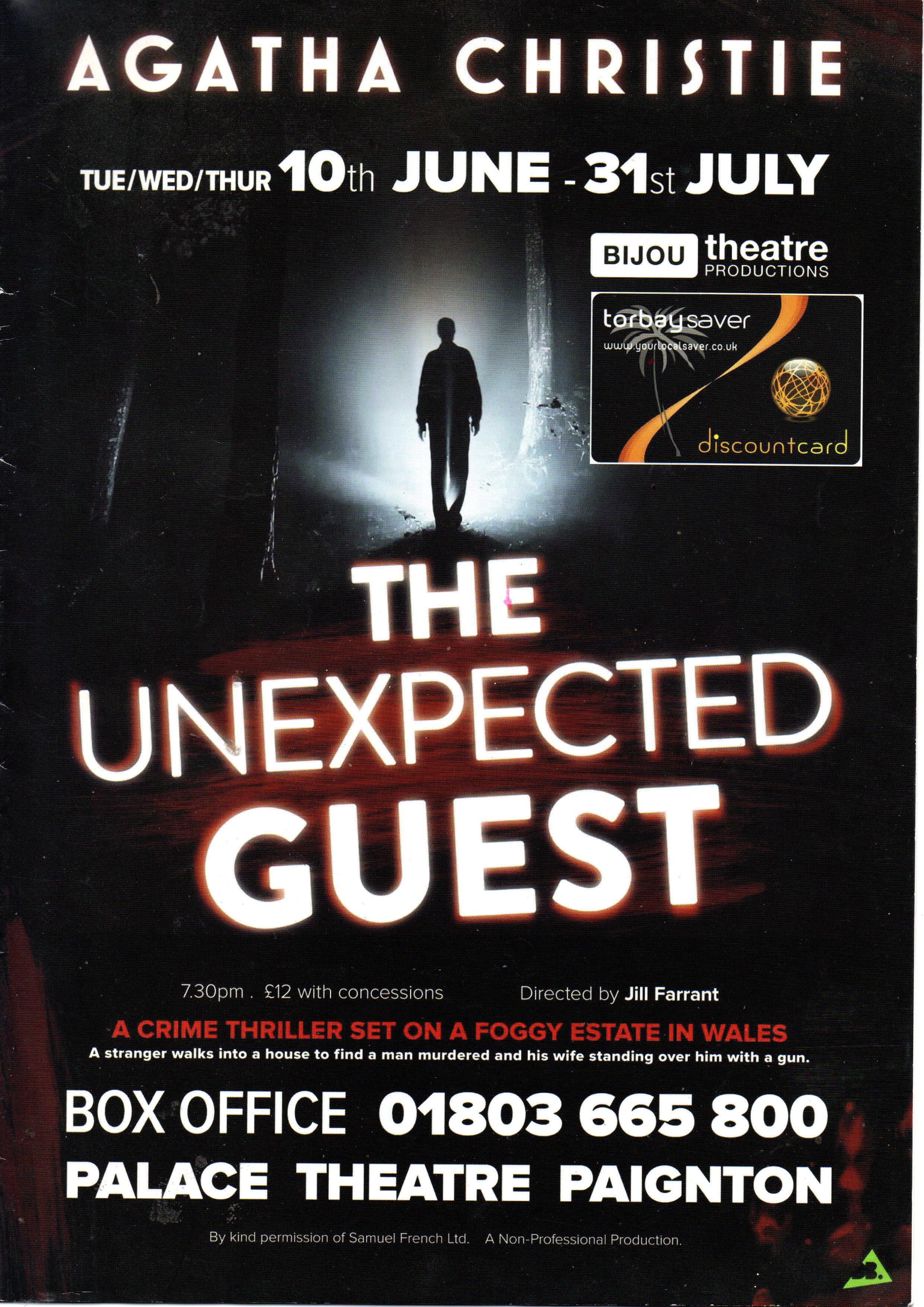
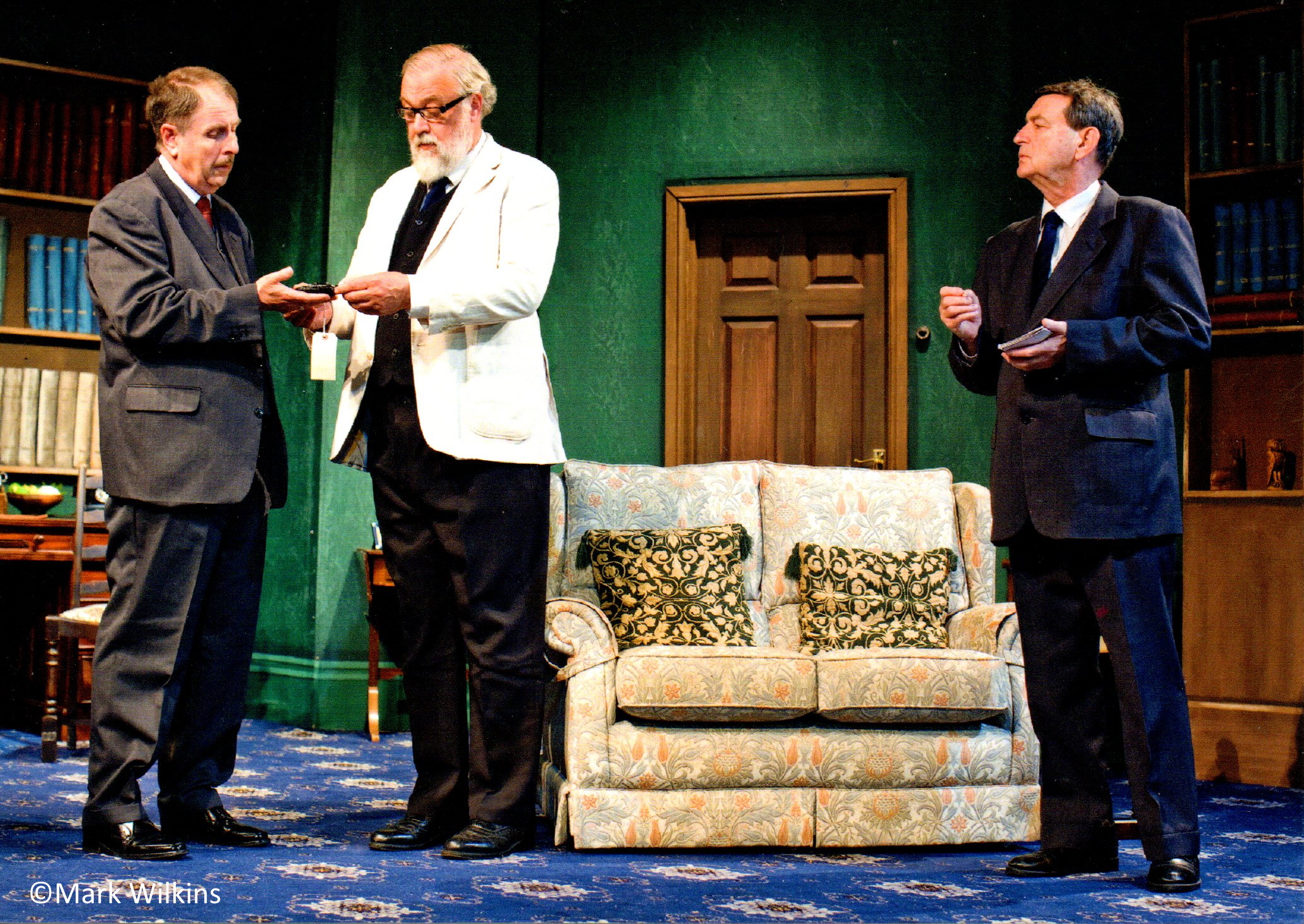
V is for Vicar of Dibley
Before Last of the Summer Wine, Bijou Theatre Productions had tackled another transfer from television to stage. The Vicar of Dibley was different as it was not a new story specially written, but a series of extracts from the sitcom series including the wedding of Alice and Hugo.
All the usual characters were there including the whole Parish Council and I played the yes, yes yes no character of Jim Trott. The whole saga was directed by John Miles. Apparently there is a sequel but not such a good script.
Unfortunately I can’t find any of my photos of the play so you will have to make do with a programme front!
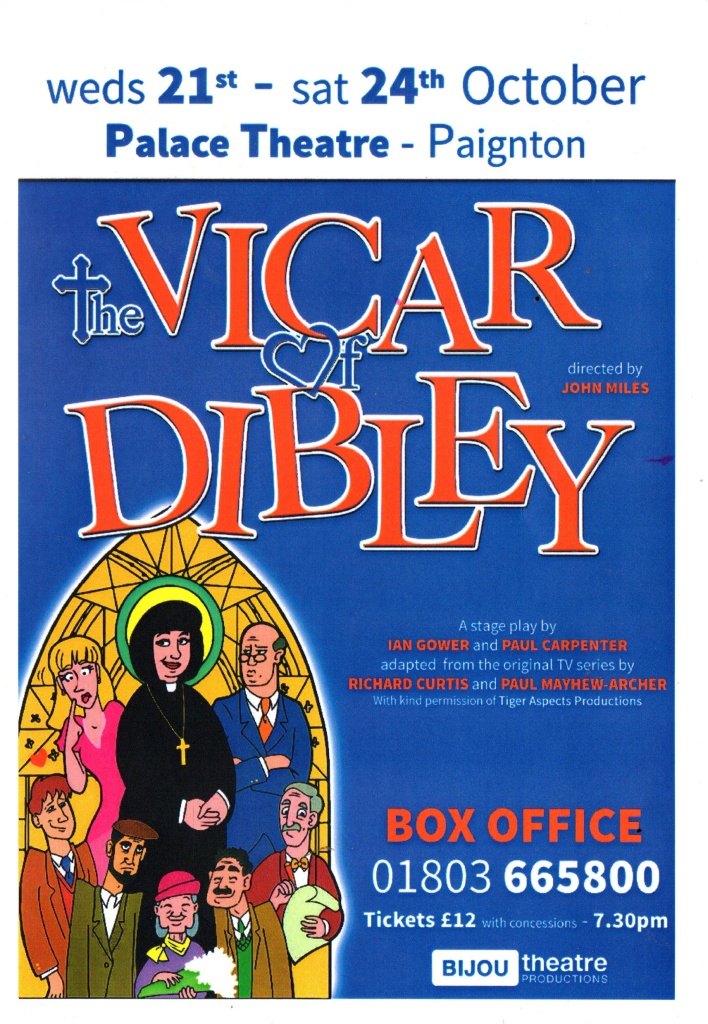
W is for When We Are Married
J B Priestly’s excellent play in which I have appeared twice.
In one of my earliest performances (in 1986) this was with Dartmouth Players at the Guildhall.
Edward Kelland and I had designed and built the set and then appeared as the reporter and Ormonroyd the drunk photographer respectively.
More than 30 years later I once again helped to build the set and appeared as the harassed local preacher Reverend Clement Mercer. Lots of pictures from the two shows – Dartmouth first.

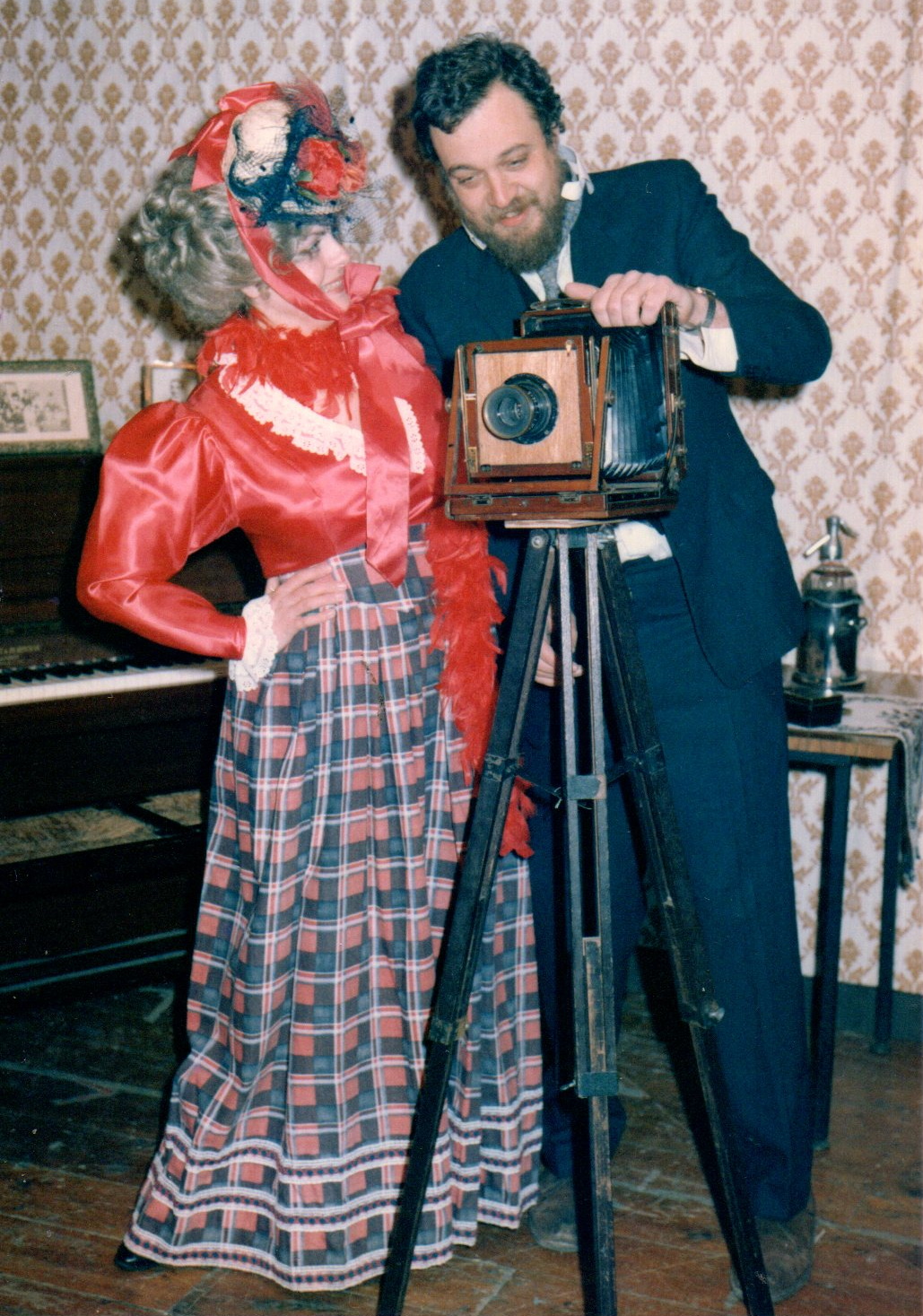
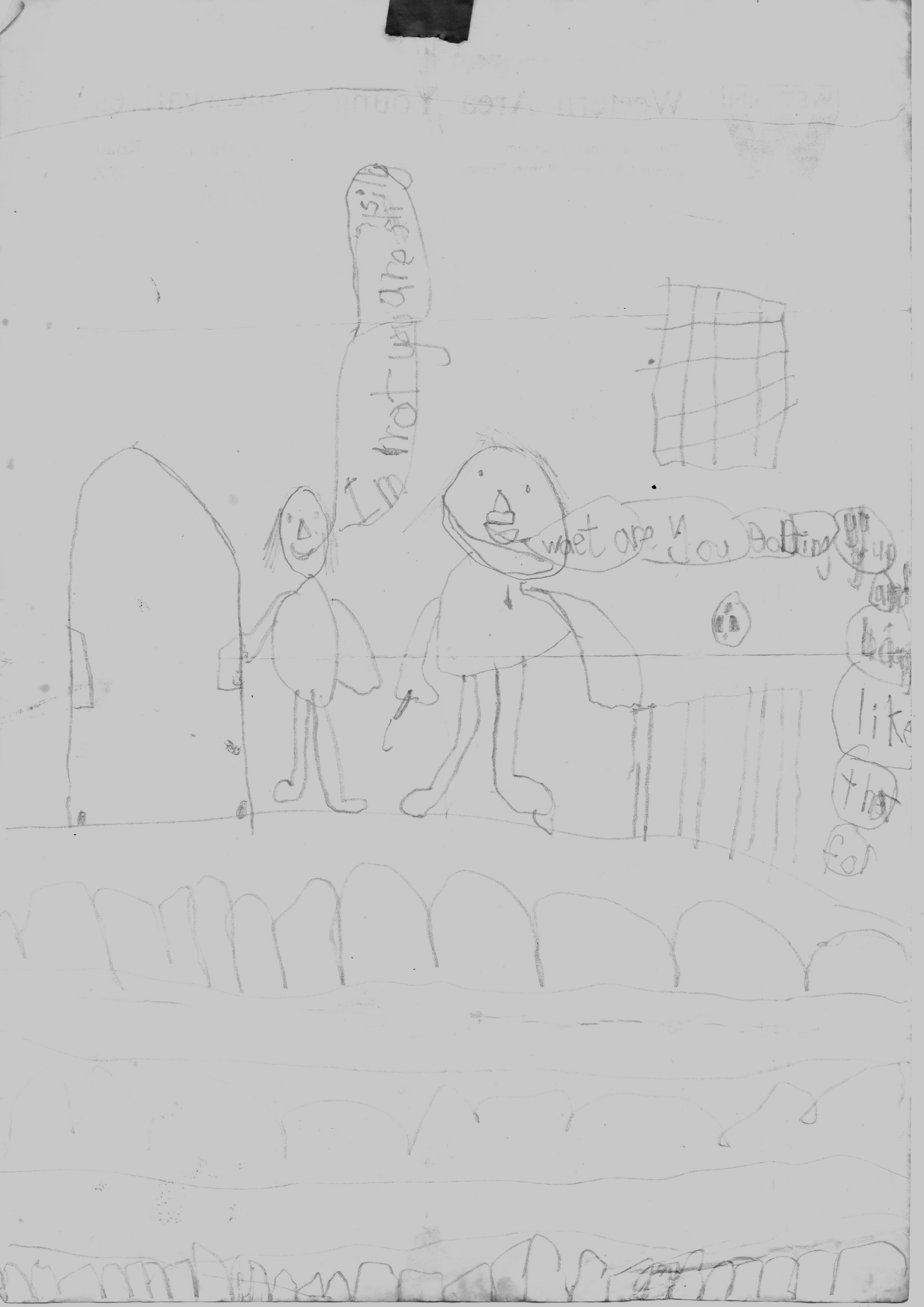

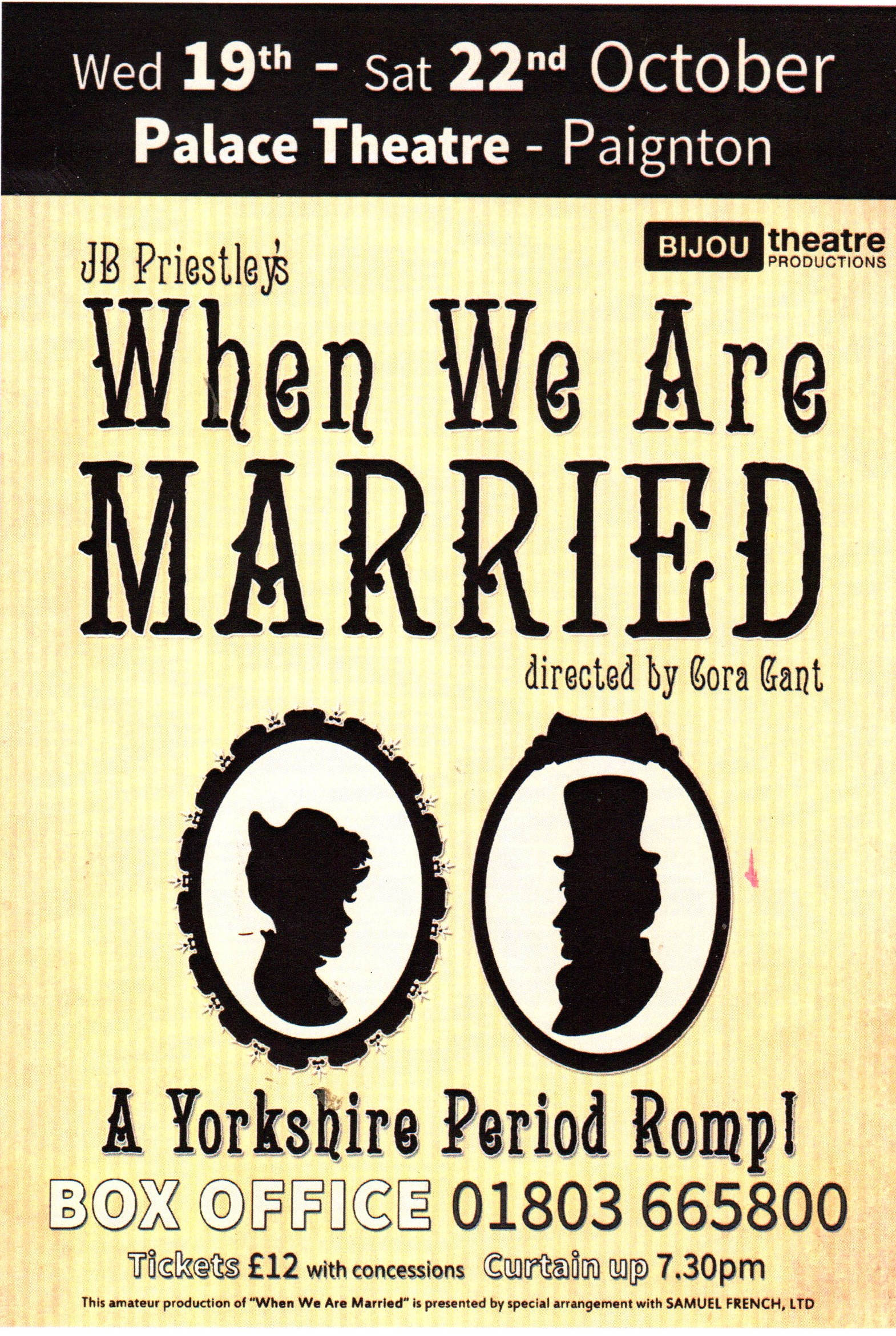
X is for eXtra!
I was a TV and film extra (or Supporting Artist) for a few years in my 60’s and had some enjoyable days and some long boring ones. I generally enjoyed those days and would carry on if it wasn’t for early mornings and long distance driving.
Two of the good days were the final scene for King Arthur with Clive Owen and Wolfman with Hugo Weaving.
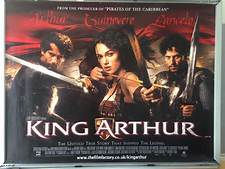
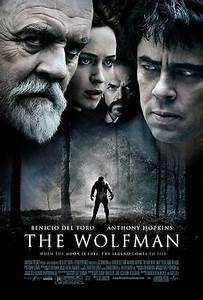
King Arthur was filmed at Hartland Point with about 500 extras but I was at the front as they preferred real beards. The day was memorable for Clive Owen going missing – watching England playing in the World cup on an extra’s phone – and Geoffrey Wildey bagging a lift back to base in one of the helicopters!
James Mackenzie-Thorpe was not impressed with the film as a whole regarding it as 2 hours of his life he would not get back.
I did 2 days on Wolfman, the second day handing over the family silver to make silver bullets!
I did a few episodes of Casualty – usually a patient lying on a couch and also Down to Earth for BBC1. On the latter worked with Bernard Cribbins and Ricky Tomlinson on Bayards Cove at Dartmouth. Great characters.
The 2nd picture here is from a Dutch TV advert for gin where I was Captain of a sailing ship – in this case on SS Great Britain in Bristol.
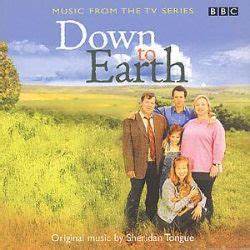

Y is for Youngsters
All theatre companies have an ageing ‘workforce’ and audience and it is our job to bring youngsters in to secure the future. That means on stage, back stage, front of house and in the audience.
One of the best ways to do that is through pantomime. my picture is of some of the youngsters (excluding Edward Kelland!) in one of Kingswear pantos. we had a principal that if any one came along to consider joining we gave then a part – however small – regardless of ability. for some it was the making of them, giving confidence etc.
The other element of panto is audience participation especially the sing-a-long at the end. That few minutes on stage can whet their appetite for many years to come.
There are often parts in the more serious productions. Bijou Theatre Productions often has a part for a young actor or actress. Agatha plays have a few such parts, and the second picture is of A Christmas Carol which needs Tiny Tim and his siblings. Oliver! also provides many parts for younger actors.
Palace Theatre has recently had sixth-formers on work experience who have stayed on to do all sorts of front of house work and set building/get outs.
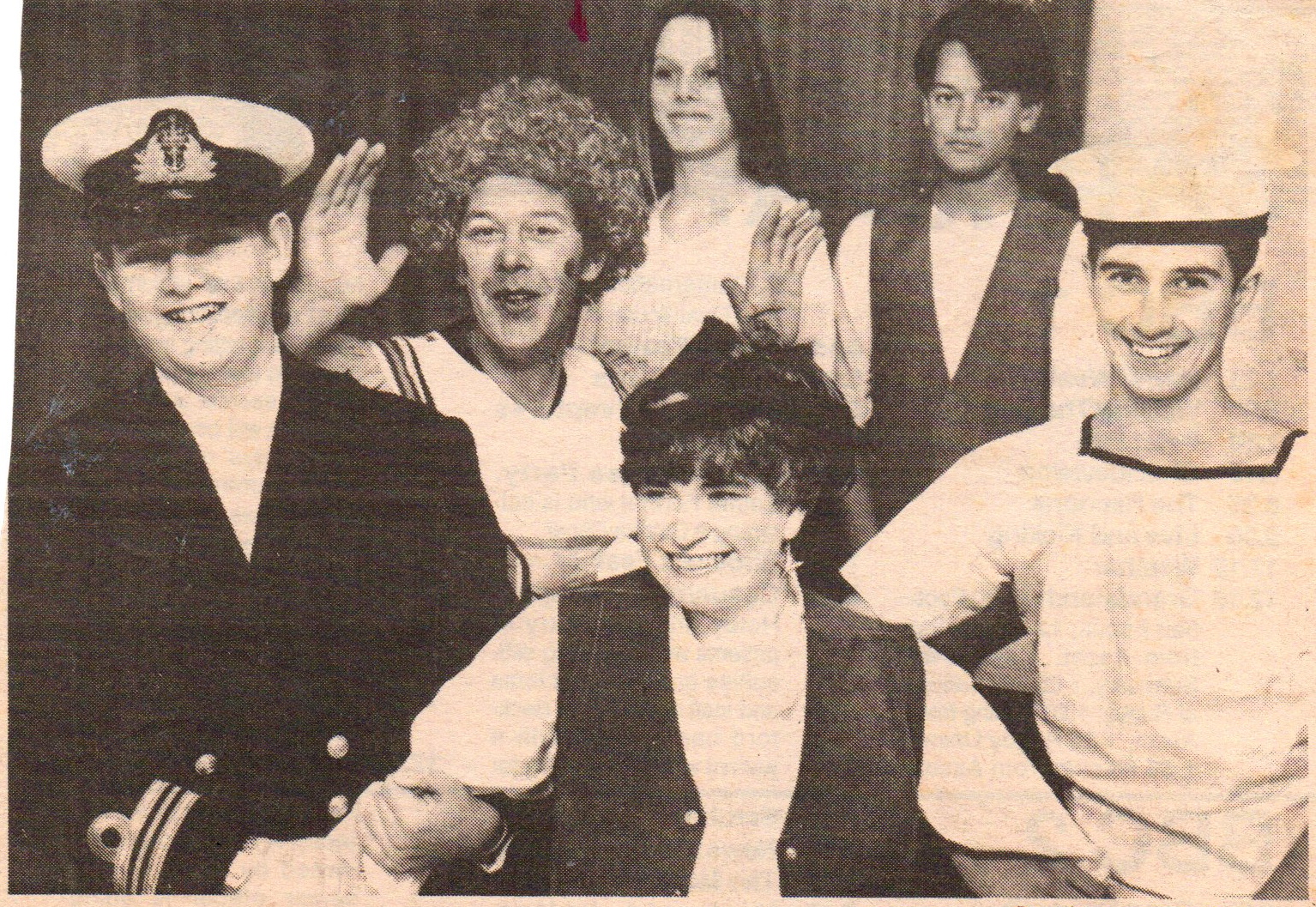
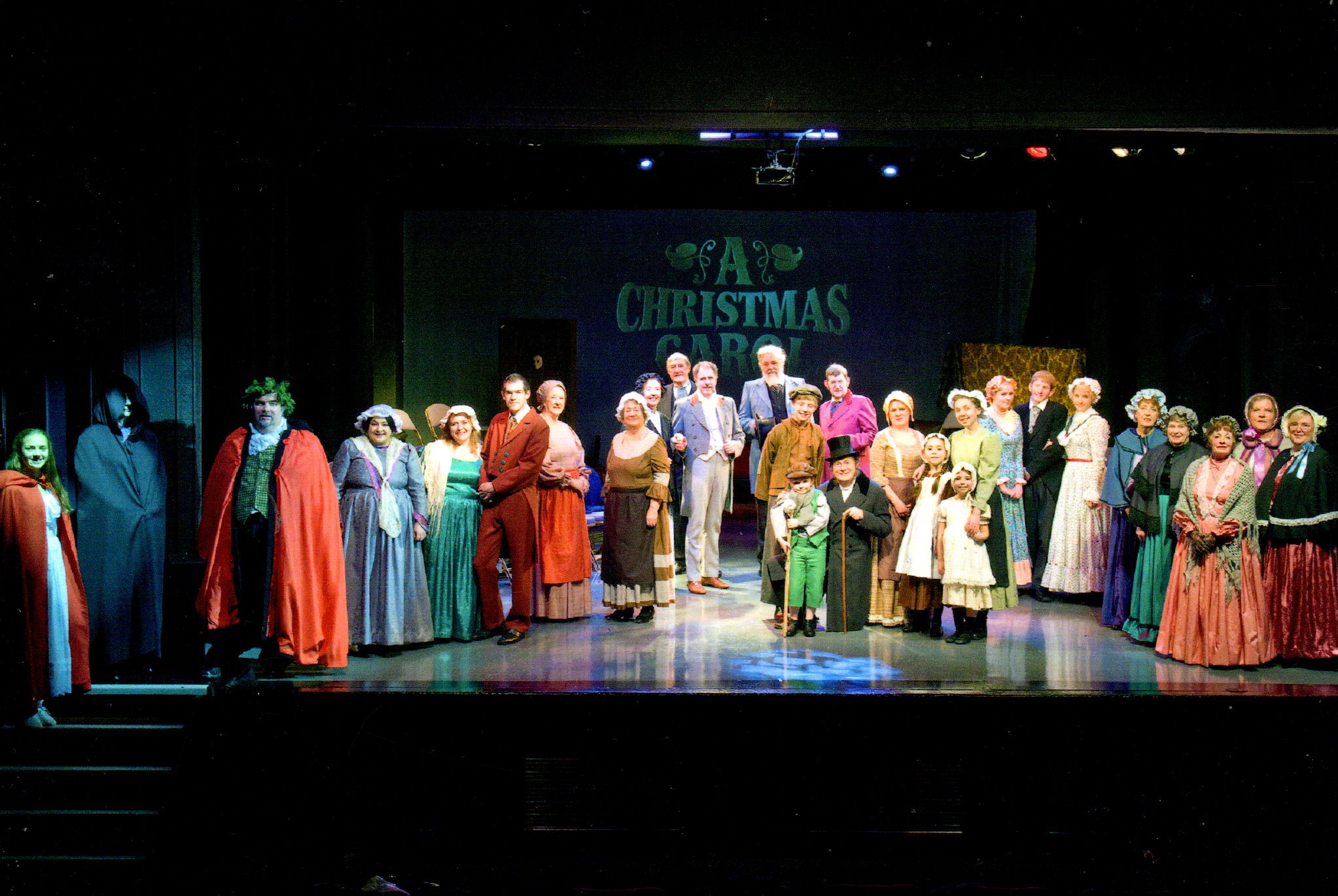
What ever the role encourage them – they are the future!
Z is for …. THE END
I can only think of one play beginning with Z – Zigger Zagger which I have neither been involved with or seen!
So save your best for last. And the best play for me is another Ronald Harwood – The Dresser. I have been involved with 2 productions and seen two others. One of these was in London with Julian Glover and Nicholas Lyndhurst and was very good. I have seen the film but the transfer from stage didn’t work that well.
My own involvement was backstage with Dartington Playgoers and as Oxenby in the Bijou Theatre Productions presentation in 1986. The Black and white photos from this production didn’t scan too well but many Bijou stalwarts are there. Mark Wilkins (who also took the photos) was ‘Sir’ the ageing actor-manager and Joe McNulty was Norman.
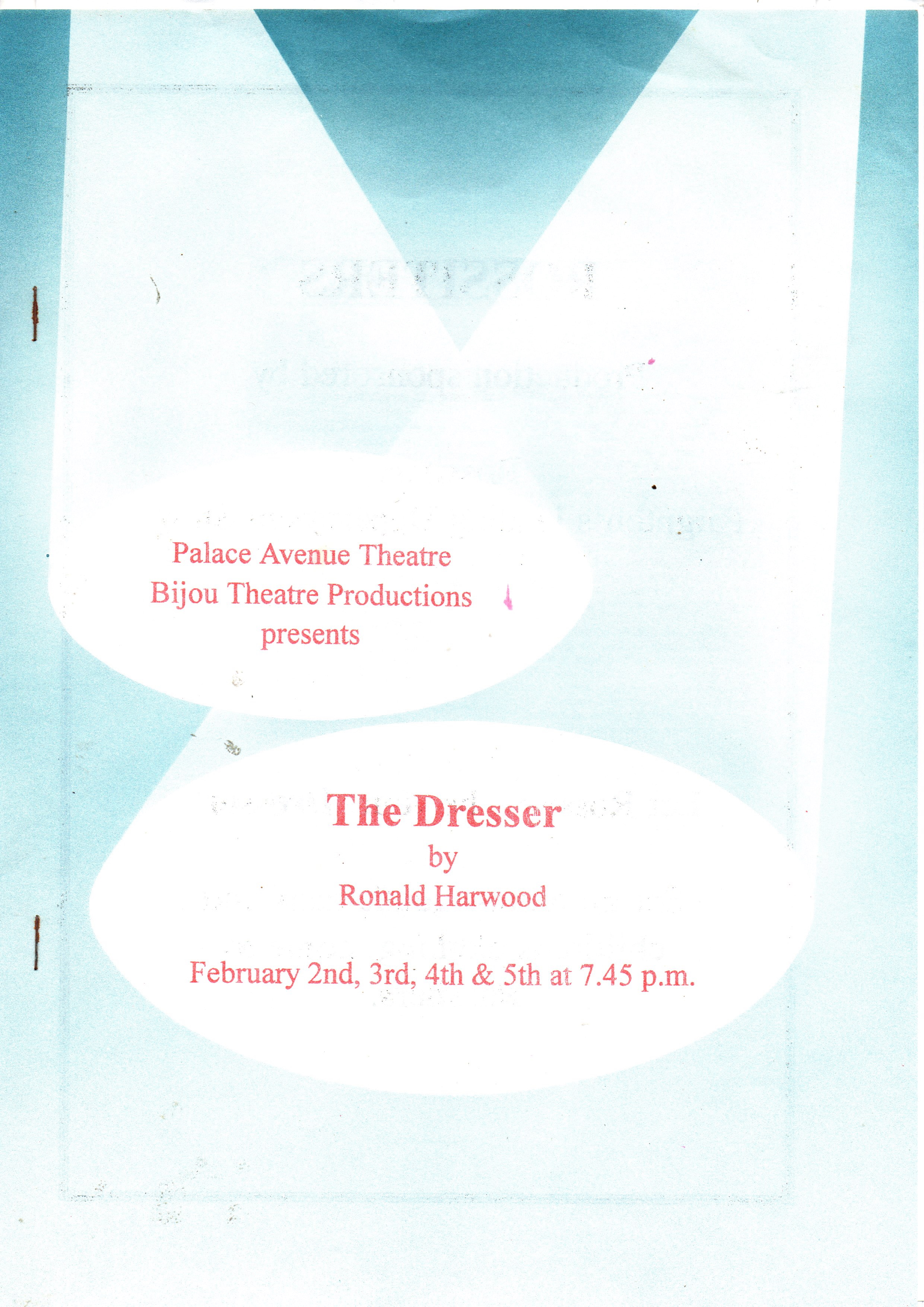
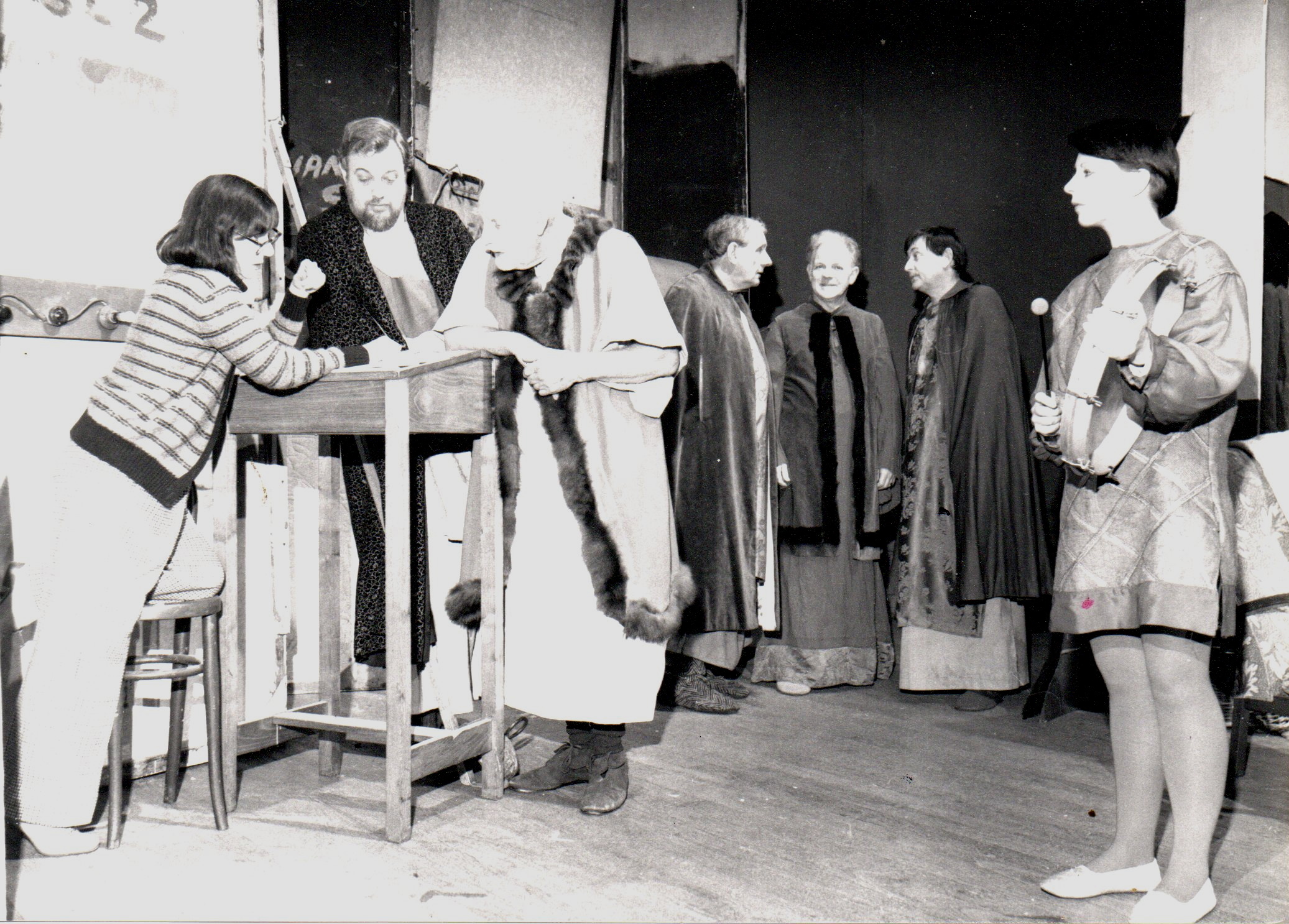
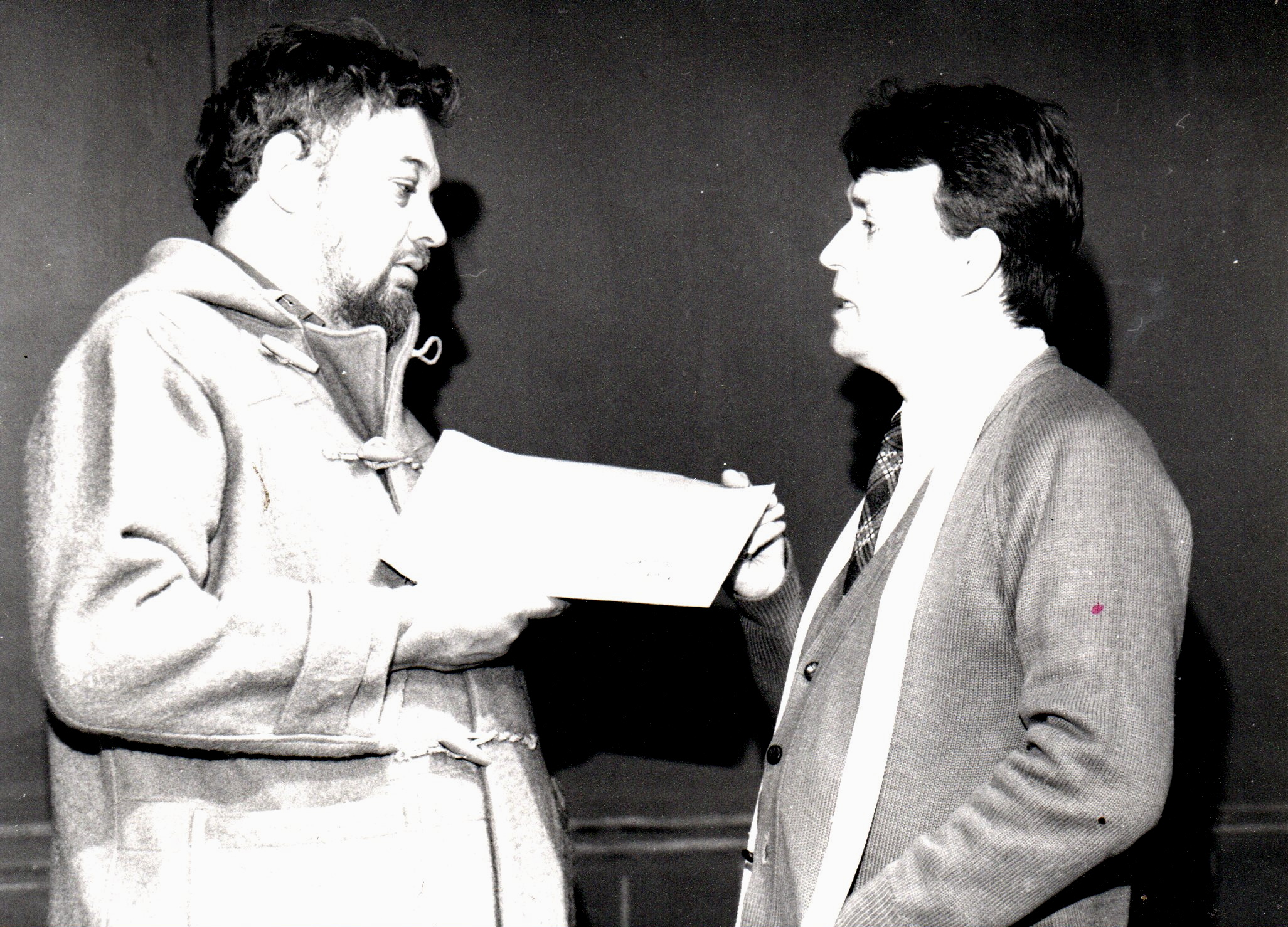
.
I would love to do this again and have my eye on the character who has to take over as Fool when his fellow actor is arrested! If you have never seen it – you must!
THE END
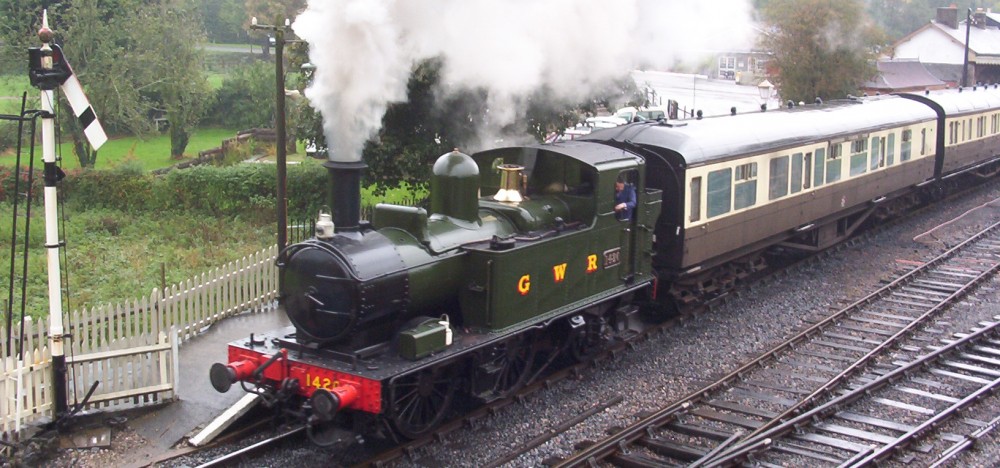
Love theatre- in particular musical theatre